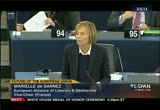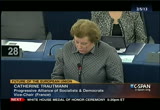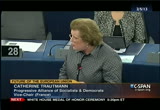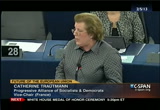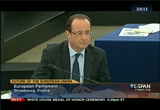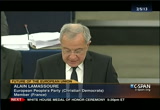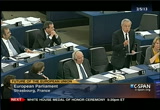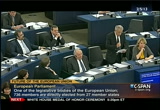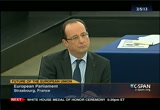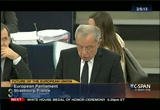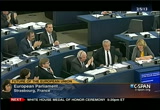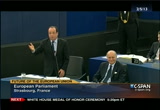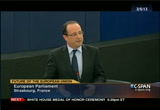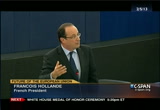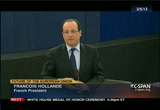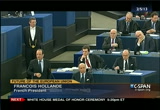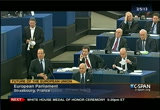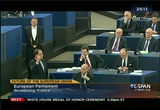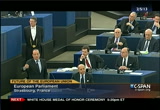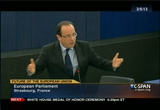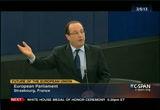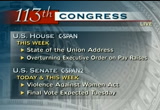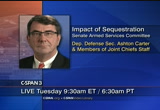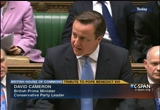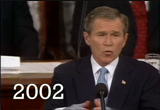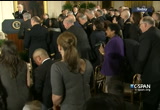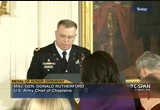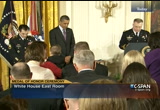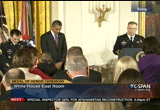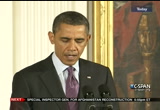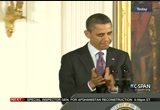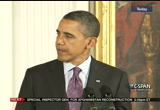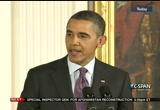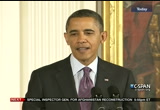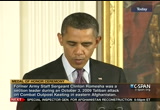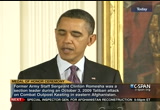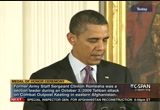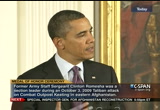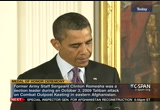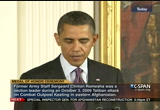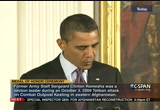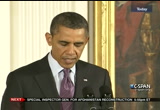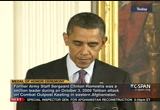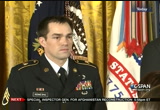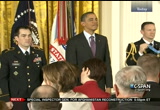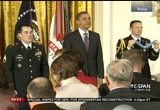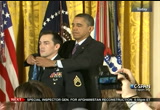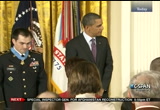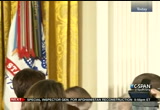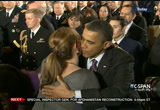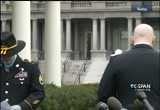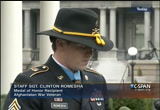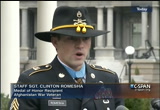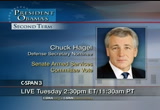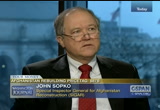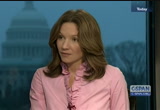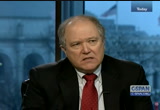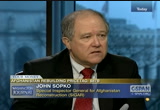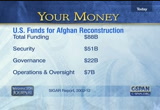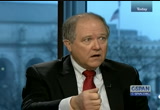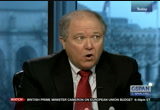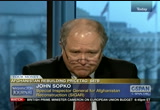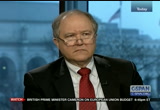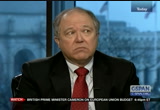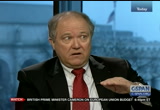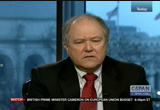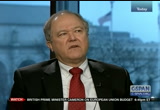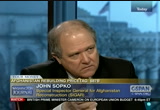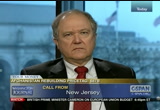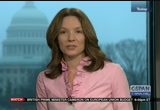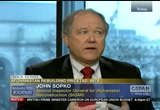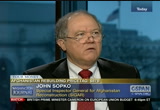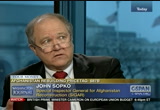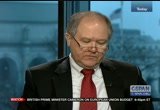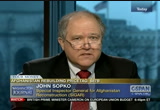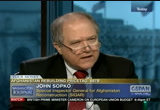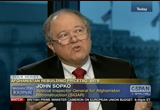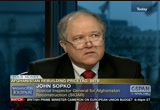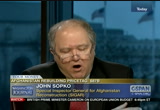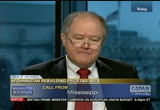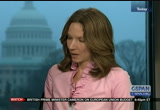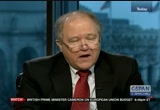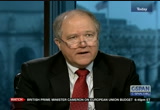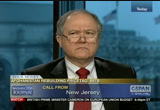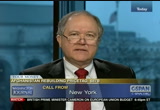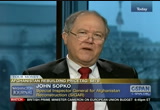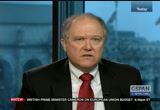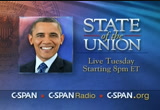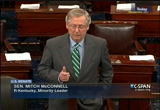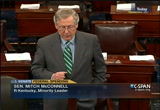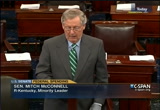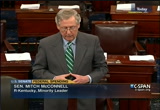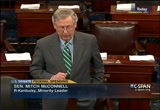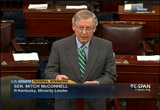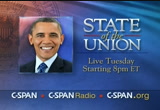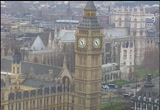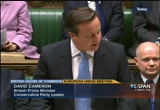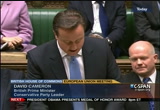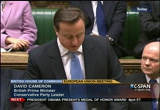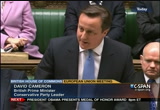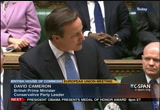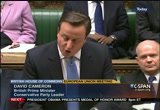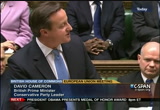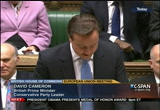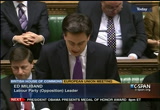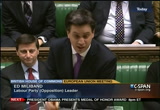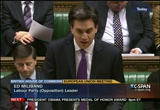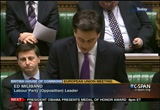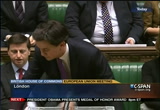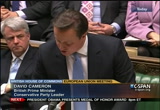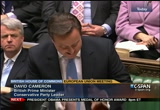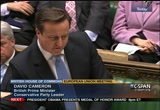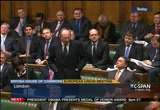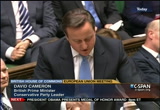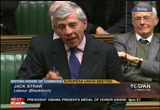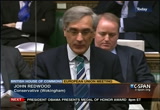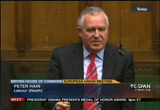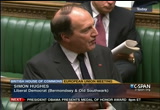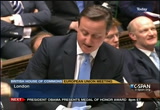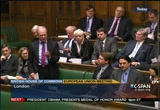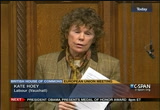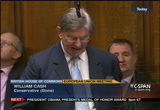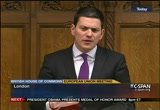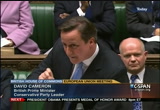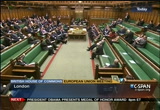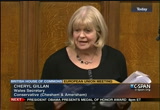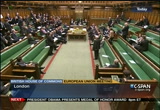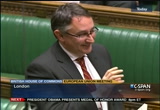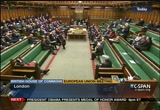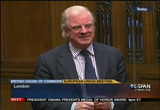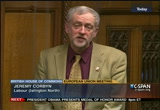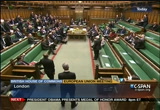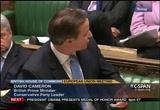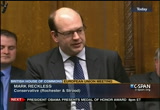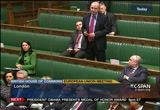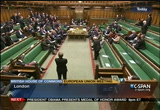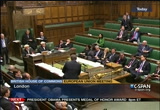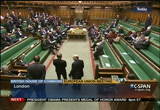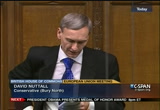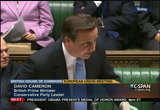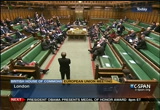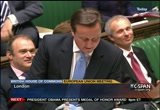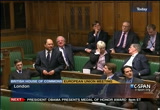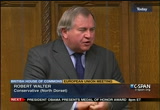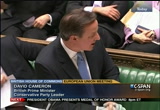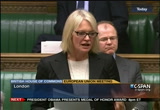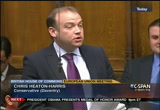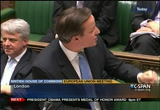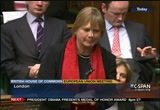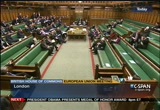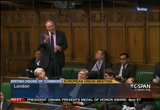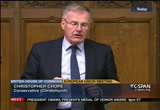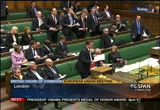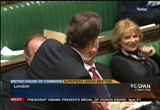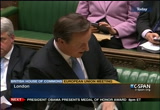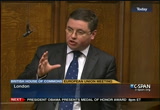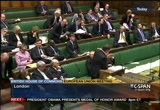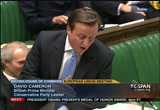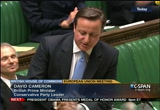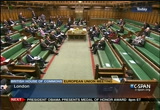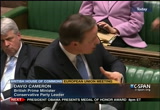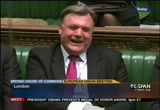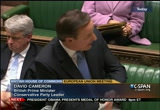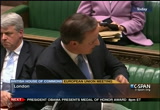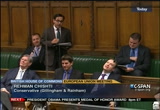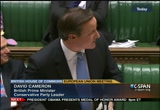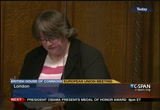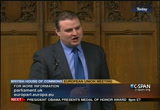tv Public Affairs CSPAN February 11, 2013 5:00pm-8:00pm EST
5:00 pm
kind of year, the more your plea to be genuinely democratic. my thought is that citizens have access and they affect them directly, validating the political guidelines that europe follows. let's do that in their name. this is what i believe, mr. president. >> thank you. mrs. chapman? mrs. chapman? >> thank you. i would like to speak to the president of the french republic, not to friends what. it is an honor to speak on behalf of my group. this is a difficult time and we should be looking at europe's future. we should also look at why the european union exists. let's also think about what this
5:01 pm
is -- what citizens aspire to. they want more solidarity at the international level. you have heard the broad range of views supporting broad intervention in mali. however, we cannot abandon all made -- but cannot defend only the interests of one state and we need a comprehensive plan for europe. this is what we're doing it with a changing europe scores. budget negotiations on the multi-annual framework are a test of that solidarity where our credibility is put to death -- protest. -- put to the test. i would like to say that for our group, it is known as well. it was not a policy of the empty chair. you have to take your
5:02 pm
responsibility. you have to discuss the issues so that we can have a budget that corresponds to the policy that we have voted on. as for the financial framework, we need to set that out for young people to guarantee employment. that is why we have a budget, a budget for investment and a pooling of our resources, which is not just about the constitutional budget. we need other resources, like the financial institution tax. this is one that france has done a lot to see happen and could be a cornerstone of resources. we need modern tools to deal with the growth issue. we cannot create solidarity between the peoples of europe if we do not talk about european assistance for the underprivileged and the vulnerable. a lot of people do not understand why we are trying to do and that means we lose
5:03 pm
credibility. the commission's voice has to be heard, and the way we help the underprivileged and the vulnerable will not be just wanting to impose solidarity. we also have to use the other policy tools in the european social fund. we need to invest to create jobs in europe. and reallocate some social funds to young people. growth and jobs are the guarantee for young people in europe. we need to work together to underscore the legitimacy of the european national parliament. we are deciding together on these issues. we need to cooperate with the national parliament and show what this group can do for the democracy.
5:04 pm
>> thank you, mr. president. president of the republic, france is a normal country in europe, but not an ordinary one. and in this time of uncertainty, europe is looking to france for two things. it needs to be exemplary at home, meeting the commitments it has made, working in a harmonious way in the european collective, and we are grateful that you up been trying to do that. there are some strange dissonances and europe is surprised to hear these. france is reducing its retirement age as europe gets older. everyone is trying to stop money being misused and promote growth to create new jobs and france is now punishing those people who want to work more than 35 hours a week and it is thriving entrepreneurs away.
5:05 pm
its partners are cutting administrative expenditures. they are using an ax to do this and france is using new clippers. -- nail clippers. we do not seem to be getting rid of any of our many civil servants in the next coming years. unemployment is rising, factories are closing, entrepreneurs are leaving and europe is getting worried. we expect france to show europe the way as one of its most committed members. you did that in mali and we pay tribute to you. that means one thing, of course. france has to propose a vision for the whole of europe. what we need to come up with today together is a model for
5:06 pm
european solidarity. kathleen trautman has just said that. your opportunity, mr. president, is that now we need to decide on the european budget right to the end of this decade. our problem is that today, a round the table of counsel, no one has done this, apart for one later with respect to their own budget. you need to win over yourself. there is no question that the u.k. have the right of veto, but france has the right of veto as well. mrs. thatcher had the right of veto. but they felt that they had to look after the destiny of europe, and they doubled regional funds and still kept
5:07 pm
the iron happy. the added budget -- the added value of the european budget is that allows us to reach a critical mass where it is necessary for big investments in the future and to keep europe's influence in the world in playing a role in the destiny of the planet. terrorists should be afraid. the u.s. industry should be afraid. because what we are going to do is come up with 810 thousands of european gdp and is going to be of maximum impact on our gdp as well. and i've even heard rumors that france will pare these numbers even more so that it gets more money back. this budget will let least be fair. when you took office in paris, mr. president, you said that
5:08 pm
fairness and justice will be priorities underpinning all of their actions. now is a chance for you to shut you meant that. the financing is the most unjust that there is. five of the richest companies pay relatively less than the 10 poorest ones, and they're all new member states. overall reform based on new resources, and we are pleased about where you had to say about that fight. you said it was basically going to fight to put a seating on -- a ceiling on its own contribution, which means making it tougher and more expensive for the poorest countries. we have to find some way of reducing for the next seven years. cohesion from expenditures,
5:09 pm
countries like greece, portugal, spain, hungary -- these countries need europe more than ever before. a-rod been separating -- suffering -- they have been suffering more than ever before. and now we are helping them less. and they do not have the political means to stand up and defend themselves. going along with a compromise on such a basis is saying that you want a europe of solidarity, starting with social europe, throughout your term of office, using mr. cameron's european budget. what kind of socialist could ever accept that? who here could never accept that? my group does not accept it. thanks very much. [applause]
5:10 pm
>> mr. president, members of the european parliament, let me begin by thanking you for the high quality of this debate, and for the candor of your remarks. let me thank you also for the usefulness of this discussion. listening to the previous comments, i was thinking to myself, you are asking a socialist to stop the conservatives from coming up with a poor budget. thank you for the trust that you have placed in me. it really does show the difference between your position .nd your government's i have to say to you here in
5:11 pm
parliament that the socialist and democrats are a minority -- a minority in the european council. i hear your message, but perhaps you might also pass it onto the heads of state in government in your own party's. that might be a good thing, indeed. [applause] i will make a commitment here to you today. throughout the council, i will continue to quote mrs. dole, the messrs. hunt said if i have to. the others, i'm not sure they will be much help. but i'm happy with what i have heard none the less. it will not all be on my shoulders. i am the head of state and our
5:12 pm
represent france at the european council negotiating table. i am not going there with rejection in mind only or not to be open to compromise. i am looking for compromise, because i want the youtube project the best image of itself that it can, that is -- i want the european union to project the best image of itself that it can, that is to say, looking at the processes and understanding the doubts that this is have and then taking into his iteration the decisions that are necessary. i will look for agreement from the council. i have been told that it cannot happen with the u.k. why should one country decide for 26 others? indeed, i think we could have agreed at the last european council.
5:13 pm
but in order to let people say that this failure was a victory, we let it happen. now it will be even more difficult to achieve agreement as a result. i think we can convince the others. you have said it, for one reason or another, countries want to hang onto their rebates. but the threat of failure might play in our favor. it might inspire an intelligent approach from people. i want more democracy and here is. you are the representatives of that democracy. it is a very good thing that you can pass judgment on what heads of state and government do and come up with. i cannot deny the fact that many
5:14 pm
heads of state and government defend national interests over and above european interests, but i cannot accept that france today would be ready to sacrifice growth as the author of the c.a.p. because that is not true. the c.a.p. will see results, and that will mean difficult restructuring, which is absolutely essential in our country. i cannot accept that we are calling growth policy into question. we were the first, if not the only country, to degroat should be a priority. -- to say that growth should be a priority. it is easy to make cuts in research, connectivity, energy,
5:15 pm
infrastructure, but that is where the future lies. i would like to respond to our colleagues from the uk. we have a lot of history behind us. and i will not say anything about the support you should have given to mr. deval, general the ball at that time. ul,given to mr. gega general degaul at that time. but i sometimes agree with mr. cameron is the party give us in our deployment tamale, he was the first to be so and he was the first to offer material support in our deployment to ma li.
5:16 pm
so i will not be so crude as to make a caricature of a country where political leader. i thank the u.k. and i also note that david cameron supports marriage for all, and that ain't -- that makes things easier for us in france as well. let me reply on the major issues affecting europe, and the questions put to me. young people, our continent is getting older. the birth rate is low. certainly, in sufficient. -- not sufficient. our policies, our choices call into question the role of young people in our society. if there's one thing that is worth our coming together, preparing the budget and the
5:17 pm
rest, then it is the place of young people in europe. and when i say young people, not just talking about erasmus and university exchange and research and mobility. they are essential, yes, but i'm also talking about young people who are poor, young people without jobs and social security behind them, yet people who are not lucky enough to go into higher education, and to feel that we are not looking out for them. this budget, whatever becomes of it, should have an exceptional measures for young people. and we need to be able to follow up on those policies in all of the countries of europe, so we can ensure that every young person can see a way out so that they have qualifications, they have the job that they can integrate into society, because there is a risk of generational detachment here, that we have young people who decide to stand
5:18 pm
against the development of our societies. let me say something now about the policy of change. we cannot just say that europe has become overvalued and this is a problem. there is an exchange policy in the treaties, not just for the european central bank to society -- to decide. it is also for the governments of europe to take a stand. it is for them to set out what priority we accord the currency. yes, there's a paradox in calling for people to be competitive, and then seeing their export prices go up. and then making it more difficult to reestablish a trade balance. at some stage, we have to take out that, it.
5:19 pm
let me wrap up on the issue of strasbourg. it was an issue that was saved. i know there are a variety of positions in this house, but i'm not just defending strasburg because it is in the treaty. i'm defending strasbourg, the capital of europe, because it is history that teaches us the role the strasbourg has to play. we celebrated the 50th anniversary of the treaty of friendship between germany and france recently. and strasbourg was part of that reconciliation between our two countries. strasbourg is but the history and future of europe. it is a city that represents what europe is. i am not just defending it because it is in france. europe has other feet in other countries. i defend strasbourg because
5:20 pm
strasbourg is europe. and if you think it should not be the seat of the european parliament, then doubt undermines everybody's view of europe. thank you very much for having me here in strasbourg at the seat of the european parliament. [applause] >> thank you, mr. president. [captioning performed by national captioning institute] [captions copyright national cable satellite corp. 2013] >> the house to the of session today. no votes are scheduled due to
5:21 pm
the president said of the union address tomorrow night. later this week, work on a bill that would overturn president obama's executive order giving federal employees across-the- board pay increases. follow the house live here on c- span when members return tomorrow. and the senate is in session today. they gambled in earlier to continue work on the bill authorizing the violence against women act. that legislation provides prosecution for violent crimes committed against women, while enhancing provisions for native american, guay, and other victims. final passage vote is expected tomorrow. watch the senate live on c- span2. tomorrow, the senate armed services committee holds a hearing on the series of automatic spending cuts known as sequestration. those cuts are scheduled to start taking place march 1. we will hear testimony from
5:22 pm
deputy defense secretary ashton carter and members of the joint chiefs of staff on what the impact of sequestration will be. see the hearing live tuesday at 9:30 a.m. eastern on c-span3. earlier today, pope benedict xvi announced he will resign february 28 due to health concerns. world leaders had been speaking about the pope's decision. here's a look at what the british prime minister david cameron had to say. >> thank you, mr. speaker. mr. speaker, i am sure the whole house will join me in sending our best with fish to pope benedict following his announcement today -- our best wishes to pulte benett following his announcement today. his visit to britain 2010 is remembered with great respect and affection. pope benedict's message on that visit of working for the common good is something that's of to our whole country and i'm sure
5:23 pm
his success will continue to provide a voice of inspiration for millions around the world. >> president obama and first lady michelle obama also released a statement, saying -- pope benedicta is 85 years old and has served in his position since 2005. he becomes the first called in over 600 years to resign. >> you might expect given the breadth and depth of products that we have, smart phones and tablets, one of the concerns is maltese craine connectivity. your couch watching tv, but also texting on your found, are
5:24 pm
also on the internet on your tablet or something like that. how do you link those devices to each other? how do we also link them to the clout or to the internet? one good example is the gallick seek camera. the the -- the galaxy camera. it is built with 3g and 4g connectivity. you can take photos and immediately applied them to a website or asocial media service. it brings wireless connectivity to a camera. linking products like that, lincoln and to the internet, to each other, that is a big opportunity for us. >> the future of consumer technology with samsung vice- president david steele. that is tonight at 8:00 p.m. eastern on the communicators on c-span2. >> having observed a steady
5:25 pm
improvement in the opportunities and well-being of our citizens, i can report to you, the state of this old by youthful union is good. >> once again, in keeping with a time honored tradition, i've come to report you on the state of the union. i am pleased to report that america is much improved and there is good reason to believe that improvement will continue. >> my duty to night is to report on the state of the union, not the state of our government, but our american community. and to set forth our responsibilities, in the words of our founders, "to form a more perfect union." the state of the union is wrong. >> as we gather tonight, our nation is at war. our economy is in recession. and the civilized world faces unprecedented dangers. yet the state of our union has
5:26 pm
never been stronger. >> it is because of our people that our future is hopeful, our journey goes forward. and the state of our union is wrong. >> tuesday, president obama delivers this year's address live on c-span, with our preview program starting at 8:00 p.m. eastern and the president at 9:00 p.m., followed by the gop response and your reaction. the state of the union tuesday night on c-span, c-span radio, and c-span.org. >> earlier today, president obama awarded a medal of honor to former army staff sergeant clamps -- clinton romesha. he was awarded for defending and afghanistan outpost in 2009, a battle that took the lives of eight american soldiers and wounded two dozen more. from the white house, this is 25 minutes. ♪ ♪ >> ladies and gentlemen, the
5:27 pm
president of the united states and mrs. michelle obama, accompanied by medal of honor recipients staff sgt clinton romesha. ["hail to the chief"] ♪ >> let's pray. eternal god, from whom we come to whom we belong, and in whose service we find peace, such as written to be found in the spirit of truth and justice. on yourselves. the you men of valor -- of
5:28 pm
valor. be ready for the conflict. today, lord, we recognize men of valor, who in readiness for the conflict, the battle came upon them. their sacred story is one of life and death, suffering of servants faithfully rendered at the moment of truth. they belong to that small band of black knights. and a nation grateful for the men who follow and the men who lead. we offer our gratitude for the actions of those men that day and for the actions of arthur rhodes, an intense man, short and wiry. thank you for claiming their sacred story and writing it into our nation's history. we distill our highest honor on staff sergeant romesha and
5:29 pm
recognize his actions that day. we pray your abiding grace and eternal mercies upon the families, the friends who gave the last full measure of devotion that day. staff sgt vernon martin. sergeant gesten dagos. sgt joshua heart. sergeant -- what curt. sergeant michael cusack. specialists stephen manes. and pse kevin thompson. we ask your blessing on all of our servicemen and women and at home and abroad to support and defend our constitution. grant them guidance. we ask this in your holy name. amen. >> please, be seated, everybody.
5:30 pm
good afternoon. on behalf of mashal and myself, welcome to the white house. every day at the white house we received thousands of letters from folks all across america and at night upstairs in my study i read a few. about three years ago i received a letter from imam in west virginia. -- from a mom in west virginia. her son, just 21 years old, had given his life in afghanistan. she had received the condolence letter that i sent to her family, as i send to every family of the fallen. and she wrote me back. mr. president, she said, you wrote me a letter telling me that my son was a hero.
5:31 pm
i just wanted you to know what kind of hero he was. my son was a great soldier, she wrote. as far back as i can remember, steffan wanted to serve his country. she spoke of how he loved his brothers, how he would do anything for them, and of the brave actions that would cost him his life, she wrote, his sacrifice was driven by pure love. today, we are honored to be joined by stephan's mother, vanessa, and his father, larry. please stand, vanessa and larry. [applause] we are joined by the families of
5:32 pm
the seven other patriots who also gave their lives that day. can we still -- can we also have them stand, so we can honor them as well? [applause] we are joined by members of bravoed troops, whose courage that day was driven by pure love. and we gather to present the medal of honor to one of the soldiers, staff sgt clinton romesha. this is our nation's highest military decoration and it reflects the gratitude of our entire country. we're joined by members of congress, leaders from across our armed forces, including the secretary of defense leon panetta, chairman of the joint
5:33 pm
chiefs of staff marty dempsey, army secretary john mchugh, and army chief of staff general rhey gauthier now. we are especially onerous -- general ray odierno. are specially liked to be joined by the iron horse division. we welcome you to the ranks. you may have a sense that clinton is a pretty humble guy. we just spent some time together in the oval office. he grew up in lake city, calif., population less than 100. we welcome his family, including mom and dad, tisch and gary. i hope you do not mind that we share that he was actually born at home.
5:34 pm
these days, clinton works in the oilfields of north dakota. he is a man of faith. and after more than a decade in uniform, he says the thing he looks forward to the most is just being a husband and father. in fact, this is not even the biggest event for clinton this week. because tomorrow, he and his wife, tammy, will celebrate their 13th wedding anniversary. this is probably not the intimate kind of anniversary you plant. -- planned. [laughter] but we're so glad that you are here, along with your three children. colin is not as shy as clinton. [laughter] he was racing around the oval office pretty good. and he sampled a number of the apples before he found the
5:35 pm
weinbaum was just right. [laughter] -- the one that was just right. [laughter] to truly understand the act -- the extraordinary actions for which clinton is being honored, you need to understand the almost unbelievable conditions under which he and his troops serve. this is a time in 2009 when many of our troops still served in small, rugged outposts, even as our commanders were shifting the focus to larger towns and cities. combat outpost keating was a collection of buildings of concrete and plywood and trenches and sandbags. of all the outposts in afghanistan, keating was among the most remote. it stands at the bottom of a steep valley surrounded by mountains. terrain that a later investigation said gave ideal cover for insurgents to attack. the investigation found that it
5:36 pm
was tactically indefensible. that is what the soldiers were asked to do, defended the indefensible. the attack came in the morning just as the sun rose. some of the guys were standing guard. most, like light, were still sleeping. the explosions shook them out of their beds and sent them rushing for weapons. and soon, the odds became clear. these 53 americans were surrounded by more than 300 taliban fighters. what happened next has been described as one of the most intense battles of the entire war in afghanistan. the attackers had the advantage, a high ground, the mountains above. and they run the machine -- they were unleashing everything they had, rocket-propelled grenades, mortars, snipers taking aim. to those americans coming -- to those americans down below, the
5:37 pm
fire was coming from every direction. they had never seen anything like it. with gun packed -- with gunfire impacting all around them, clinton raised to one of the barracks machine guns. he took aim at one of the enemy teams and took it out. a rocket-propelled grenade exploded, sending shrapnel into his hip, his arm, and into his neck. but he kept fighting, disregarding his own wound, and tending to an injured conrad instead. then over the radio came words no soldier ever wants to hear. enemy in the wire. the taliban had penetrated the camp and were taking over buildings. the combat was close, as taught -- at times as close as 10 feet. when clinton took aim at three of them, they never took another step. but still, the enemy advance. the americans pulled back to
5:38 pm
buildings that are easier to defend to make one last stand. one of them was later compared to the alamo -- one of them later compared it to the alamo. keating, it seemed, was going to be overrun. and that is when clinton romesha decided to take the camp back. he gathered up his guys and they began to fight their way back, storming one building, then another, pushing the enemy back, having to actually shoot up at the enemy in the mountains above. by now, most of the camp was on fire. amid the flames and smoke, clinton stood in the doorway, calling in an airstrike that shook the buildings around them. over the radio, they heard comrades pinned down in a humvee. clinton and his team unloaded everything they had into the enemy positions, and with that cover, three wounded americans made their escape, including a grievously injured stephany spirit -- steffan mace.
5:39 pm
but more injured were out there. clinton and his team started charging as enemy fire poured down. and it kept charging, 50 meters, 80 meters, ultimately, a 100-meter run through a hail of bullets. they reached their fallen friends and they brought them home. throughout history, the question has often been asked, why. why do those in uniform take such extraordinary risks? and what compels them to such courage? if you ask clinton and any of these soldiers here today, they will tell you, they fight for our country and for our freedom. they fight to come home to their families. most of all, they fight for each other, to keep each other safe,
5:40 pm
and to have each other's backs. i called clinton to tell him that he would receive his medal. he said he was honored, but he also said, it was not just me out there, but a team effort. so today, we also honor this american team, including those who made the ultimate sacrifice. private first class kevin thompson, who would have turned 26 years old today. sgt michaels cusack -- michael scuza. sergeant christopher griffin. staff sergeant justin gallegos. staff sgt vernon martin. sgt joshua heart. and a specialist steffan mace. each of these patriots gave their lives looking out for each other in a battle that raged all day. that brand of selflessness was displayed again and again and
5:41 pm
again. soldiers exposing themselves to enemy fire to pull a comrade to safety. tending to each other's loans, performing transfusions, giving each other their own blood. if you seek a measure that day, you need to look no further than the ribbons and medals that grace their chests. 37 army commendation medals. for their bones, 27 per parts. for their valor, 18 bronze stars. before their gallantry, nine silver stars. these men were outnumbered, outgunned, and almost overrun. looking back, one of them said, i'm surprised that we made it out. but here they are today. and this -- i ask this band of brothers to stand and except the gratitude of our entire nation. -- accept the gratitude of our
5:42 pm
entire nation. [applause] there are many lessons from this event. one of them is that our troops try never, ever be put in a position where they have to defend the indefensible. but that is what the soldiers did for each other in sacrifice driven by pure love. and because they did, eight breeding families were at least -- eight grieving families were able to welcome their sons home one last time, and many are
5:43 pm
there to carry on to keep alive the memories of their fallen brothers, and to help us to remember why this country remains strong and free. how so few americans prevailed against so many, as to prepare for the citation, i will leave you with the words of clinton himself. because they say something about the army and something about america. they say something about our spirit, which will never be broken. "we were not going to be beaten that day. we will not back down in the face of diversity like that -- adversity like that. we're just going to win, plain and simple." god bless you, clinton romesha, and all of your team. god bless all who serve, and god bless the united states of america.
5:44 pm
with that, i would like the citation to be ready. >> the president of the united states of america, authorized by act of congress, march 3, 1963, has awarded in the name of congress the medal of honor to staff sergeant clinton romesha, u.s. army, force -- for conspicuous gallantry and intricately above and beyond the call of duty. clinton romesha this in which and self at the risk of his life above and beyond the call of duty while serving in the fourth brigade combat team, fourth infantry division, during combat against an enemy in
5:45 pm
afghanistan on october 3, 2009. on that morning, staff sergeant romesha and his comrades awakened to an attack by an estimated 300 enemy fighters, employing concentrated fire from a rocket-propelled grenade from anti-aircraft machine guns, and small armed fighter -- fire as well as mortars. they were compelled to seek reinforcements from the barracks before returning action. staff sergeant romesha to god and an enemy machine-gun team, and while engaging a second, the generator he was using for cover was struck by an rpd, and looking him with shrapnel wound. undeterred by his injuries, he continued to fight and upon the arrival of another soldier to aid him and the assistant gunner, he then assembled as it -- additional soldiers. he mobilized a five-man team and
5:46 pm
it returned to the fight equipped with a sniper rifle. with out regard to his own safety, he consistently exposed himself to enemy fire as he moved confidently about the battlefield, killing many enemy fighters. while orchestrating a successful plan to secure and reinforced key point of the battlefield, staff sergeant romesha maintain communication through radio with the tactical operations center. as the enemy forces attacked with greater ferocity, staff sergeant romesha identify the point of attack and directed air support to destroy over 30 enemy fighters. after receiving reports of seriously injured soldiers at a distant opposition, he provided covering fire for them to safely reach the aid station. upon receiving the next objective, his team pushed
5:47 pm
forward 100 meters over -- under overwhelming enemy fire to prevent the fighters from taking the bodies of their fallen comrades. his heroic actions throughout the day-long battle were critical in suppressing far greater numbers. his efforts gave the opportunity to reorganize and prepare for a counterattack and allowed the trip to account for its personnel and security outpost. his discipline and extraordinary heroism above and beyond the call of duty reflect great credit upon himself, bravo troupe, the third squadron, 64th cavalry regiment, fourth brigade combat team, fourth infantry division, and the united states army.
5:48 pm
5:49 pm
death. the great blessing of being a part of this country with the honor example of staff sergeant romesha, for this, we'd bring you thanks. we were deeply blessed by his presence. as his ancestors inspired his service, they inspire greater generations into service. the periphery of a province that we would be kept safe, that we return our hearts to you each and every day. we ask this in your holy name each and every day. amen. >> thank you, everybody. most of all, thank you for plant -- clinton and the entire team and their extraordinary devotion and service to our country. we will have an opportunity to celebrate.
5:50 pm
there will be a wonderful reception. i hear the food around here is pretty good. i know the band is good. and colin really needs to get down [laughter] enjoy, everybody. give our newest recipient of the medal of honor a big round of applause once again [applause] -- once again pureed [applause] -- once again. [applause]
5:52 pm
>> today marked the fourth time a living iraq or afghanistan war veteran had been awarded the medal of honor. after the ceremony, the army staff sergeant spoke briefly with reporters. here's a look. >> good afternoon. >> come over here. >> thank you. good afternoon and thank you for joining us. my name is captain dan murphy. in a moment and i will introduce clint romesha to you. he has a few remarks to make, but he will not be taking any questions today. if there are any questions you have, we will follow up with his phone number and everything. it is my privilege and honor to introduce a former staff sergeant, clint romesha 8. -- clint romesha. >> members of the media, ladies and gentlemen, good afternoon
5:53 pm
thank you for sharing this very special day with me. i stand here with mixed emotions of both joy and sadness for me today. i do not think i am much different than a medal of honor recipient, first-class patriot, and farmers -- a sergeant junta. and feeling conflicted with this model i now where, the jury comes with the recognition -- the joy comes with the recognition of what we do on the battlefield, but is countered by the constant reminder of the loss of my battle buddies, my soldiers. my friends. i am grateful that some of the heroes of combat outpost keating are here with us. and any one of them will tell you we were not going to be
5:54 pm
beaten that day. i want them to know how proud i am of them. they trusted in may, a noncommissioned officer, to be their leader, and i thank them so much for that loyalty. i accept this tremendous honor on behalf of all soldiers who served with me that day. this award is for the eight soldiers who did not make it. and for the rest of the team that fought valiantly and magnificent the -- magnificently that day. i will forever be humbled by their bravery, their commitment to service, and their loyalty to one another. serving our nation in uniform is a privilege, especially during
5:55 pm
times of war. like my grandfather, my father, and my brothers, i am proud to have the opportunity to serve with some of the finest soldiers today. not only doing our mission in afghanistan, but on all of my deployments and tours in my 11 years in the army. our military service has strengthened, thanks to the tremendous support provided by military families and the american public. the strength of my wife and my family during my service is a key factor in my morale, in my will to fight. my loving wife has been a constant source of strength and inspiration. thank you, tammy. you are my rock.
5:56 pm
and thank you. [captioning performed by national captioning institute] [captions copyright national cable satellite corp. 2013] >> you can see the medal of honor ceremony again tonight at 8:00 p.m. eastern here on c- span. and the prime-time schedule tonight includes president obama taking part in the medal of honor ceremony and on c-span2 "the communicators"with a look at the future of technology. 3 and on in look at -- and on c-span3 a look at the future of technology and financial policy. and the chairman of the armed services committee says they plan on voting on chuck hagel to be defense secretary tomorrow afternoon. carl levin said he intends to vote after the committee discussion. south carolina senator lynsey
5:57 pm
gramm said yesterday he will hold up the nomination until he gets more information from the obama administration on the attack on the u.s. consulate from bank azia last september. -- in benghazi last september. i will have that on a companion network on c-span for 3. >> the first lady has a podium, and she chose to use it. i think that was her statement. i think knowing that, it was after i made the radio address about the treatment of women and children by the taliban, while after that, i was hearing from jenna, who was in texas. we went shopping and the ladies at the cosmetic counters, who worked there in the department store, they came up and said,
5:58 pm
thank you for speaking for women in afghanistan. and that was the first time i thought, hey, they hurt me. i knew intellectually that the first lady -- they heard me. i knew intellectually at the first lady had a podium, but not really until then. >> a first of its kind project for television, examining the public and private lives of the women who serve as first lady. season one begins monday at 9:00 p.m. eastern and pacific. >> next, a look at the ongoing costs of reconstruction efforts in afghanistan. from "washington journal" this is 40 minutes. host: our focus is rebuilding afghanistan. john sopko is our guest.
5:59 pm
he is the special inspector general for reconstruction. you have your own acronym. [laughter] here in washington, that is important. the price tag so far for rebuilding afghanistan, $87 billion. what is your role in overseeing that money? guest: well, if sigar was set up by congress to oversee and make sure the money is spent well. i got the job appointed by the president in july. we are a full- we are full service inspector general's office. we do audits, inspections, and criminal investigations. we have 200 people looking to see if the money is well spent. if there's any theft, we will investigate and turnover to the
6:00 pm
justice department for prosecution. host: do you have every single dollar of that $87 billion accounted for? guest: no. i don't think anybody -- and that's the problem. it is a hard area to work. that's the amount of money than has been appropriated so far. over the last 10 years. if you include the $10 billion or so that is in the president's budget, it comes close to $100 billion. of that amount, a good amount, almost $30 billion, even though it's appropriated, has not been spent. we are trying to get a handle on that right now. that is what we are focusing on, particularly now because of the changes that are occurring in afghanistan, the drawdown in troops, now's the time to focus on how we spend money wisely. host: so it has not been spent. as it left washington to afghanistan? guest: no, technically it is
6:01 pm
appropriated, has been obligated but not yet spent. some of it is right here in washington. what we are trying to do is we're not saying you cannot or should not spend it, but now's the time to rethink our strategy, particularly as the number of troops is going down, the security situation may change and it may have a direct impact on the success or failure of that money. host: let's look and how u.s. funds are being spent. total funding, the total authorized, $80 billion. the biggest piece of this pie is security. guest: many people when you think of the construction, you think about building schools, clinics, education, issues like that. the way that reconstructed is defined under the statute also includes security. over 50% of the amount of money we have spent actually goes to hiring, training, paying
6:02 pm
salaries, supporting the afghan national security forces, which is made up of their army, their national police, and their local police. so over 60% goes for that prevents what we're looking at also. host: why does it cost that much? is that a large figure when compared to what it takes to maintain our armed forces in the united states? guest: well, when this started, the country of afghanistan was in shambles. we had to rebuild the military, their security forces. this is -- the president has said and the vice president has talked about that this is's the afghans'
6:03 pm
war and we are here to help them. -- this is the afghans' war. it's important they have a security force to take over the responsibilities. we are rebuilding it almost from scratch. everything from the salaries to building bases for them, supplying from shoes to airplanes, that all is part of the afghan national security budget. that is a key element of our strategy to get out of afghanistan. host: $22 billion for governance. what does that mean? guest: talking about a country that was in shambles, again, after the taliban were kicked out. it is a country that has been at war for over 30 years. governance is everything from cleaning the streets to setting up a finance ministry to collect revenue. we and our allies have been spending billions of dollars to try to strengthen the government, rebuild that government so it can take on
6:04 pm
its responsibilities. host: your latest report, what are your concerns about how the moneys being spent? $4 billion for fuel for the afghan national army, questionable. the list goes on. guest: we're finding problems in lot of various. what we highlighted is that there are probably seven big areas, seven big questions, that if you are going to succeed -- and we hope the u.s. government and our allies succeed -- you need to focus on these seven questions to make certain you will succeed. one is the program or policy we are funding, does it? meet our national it surprisingly, sometimes these programs don't. as a matter of fact, they do the opposite. we want to make certain the
6:05 pm
afghans want these programs and policies. we have to make certain that a coordinated. we consider the security implications and what that means for managing or overseeing a contract. also have to take into consideration the serious problem of corruption there. sustainability is another big issue. to go back to your question, what is the problem? the seven questions lay out what we say are the big problems. congress needs to hold the executive branch accountable and the executive branch needs to review their programs to make certain they answer those questions in the affirmative. if they do, that program is more likely to succeed and to fail. if they don't, you see the problems we have identified in the report and they will reoccur again and again. host: let's show our viewers some pictures from your report. here's a largely unused border
6:06 pm
police facility, $7 million for this. you identified $6 million for questionable repairs to afghan police vehicles. here's a picture of some of the vehicles. the list included vehicles that were ultimately destroyed. they could not even be repaired. who is requesting money for these types of projects? is it the afghans or our military soldiers? guest: it is all the above. sometimes none of the above. that's where we are going back to the seven questions. it is so surprising that we will come into -- and i think that you've cited one of the garrisons that we inspected -- apparently, nobody spoke to the afghans. so it was built. somebody had a great idea to build this garrison.
6:07 pm
we have seen this repeatedly, where we are not even telling the afghans what we are building. now we are planning to turn things over to them. if it's not coordinated with them, it will be hard for them to sustain. we found schools, clinics where the afghans don't even know we are building it until the end when we give them the keys that they say, you have a new school and you'll have to support it. who is doing this? a lot of these come from the u.s. military. a lot of it comes from aid. but it goes back to the seven questions. if they ask those seven questions and really hold themselves accountable, we should not have these problems. host: let's get our viewers involved. the inspector general responsible for looking at the money in rebuilding afghanistan. in new jersey, an independent caller. caller: good morning. i remember the green party -- i am a member of the green party.
6:08 pm
there are global implications even force afghanistan and it deals with land reform. the idea of value captured, this is something even the world bank is looking at. from what i have read of the economic activity in cities like kabul, there's a great deal of land speculation. we feel very strongly that the value capture idea or land on taxation will go a long way to channeling resources that are made available away from the land grabbing interests in the country to the actual people who need the resources, to pay for public goods and services. i would be interested to know is land reform in your report and how is evaluated at? member two, the whole issue of value capture, is on the table in discussions with
6:09 pm
afghanistan's political leaders? guest: i know land reform and land prices are serious issue over there. the last time i was in afghanistan was last week. afghan nationals and some of our people told us how the prices have gone up dramatically. i don't know how the afghan government is going about capturing the increase in prices, the value. we are looking currently at the capability of the afghan government to collect taxes and how, because that is part of the governance issue, they cannot collect taxes. they cannot sustain all the things we are building for them if they cannot collect taxes. that's a serious problem. whether valuation and paying property taxes or whatever the answer, i don't know. idon't develop the programs,
6:10 pm
don't develop policy, i don't do foreign policy or military policy or military objectives. once congress and the executive branch decide what the policy or program is, then we see how well it's done and if there are problems, we make recommendations. going back to the taxation issue, it's a critical issue. now the afghan government, what they collect is about $2 billion per year. just paying for the afghan national security force is over $4 billion. then and all the other programs. the problem is there's a delta between what the afghans collect and it cost of running their government, the cost of fighting the taliban, the cost of maintaining order. that difference is being supported by the united states taxpayer and by our allies. but it is conditioned. the caller and others have some concerns about how well that is
6:11 pm
being spent. that is the value. a lot of discussion came out of the tokyo accords about the international community will not walk, but they're trying to put conditions on the ability of the afghan government to govern and to fight corruption. people see what happens on that. host: how many times have you been to of tennis fans? guest: i've been there twice and have only been on the job seven months. you have to get there and kick the tires. i usually go two since a time. i plan to go there every quarter. >> when you are there investigating a certain program, webster's you the most from afghans about how the money was being used? what is the biggest excuse? guest: i don't know about an excuse. the biggest concern was the afghans that i need as well as the u.s. military and officials there are two. the two biggest are corruption and security.
6:12 pm
if you don't have security, you are not going to have good governance. all of these programs are at risk. the other issues as corruption. we're not talking about nickels or dimes. we are talking about major corruption. polling has been done of the afghan people, it's the biggest issue. corruption at the local and national level. host: $87 billion authorized to be spent. how much has been lost to corruption? guest: that's a hard figure to get. a lot. but the amount of corruption, i will be bad for the historians to figure out. host: billions? guest: definitely. my job is to try to prevent this. if we find american citizens or others who have profited by it, it's my job to investigate and turn over to prosecutors. it's a nice figure to debate,
6:13 pm
but the important thing is how do we stops that impacting our program? host: on twitter -- guest: that's correct. or they came with running water and electricity supply system and the big concern is they did not think in terms of how the afghans are going to sustain this. some very sophisticated systems. one of the reports i came out with the, it is funny except for the fact it is taxpayer money is involved. the waste water treatment center is up the hill and not down the hill. you have to pump out the sewage. to run the pumps it is so exorbitant, there's no way the afghans can do it. so the sewage treatment plant will fail and all the raw sewage will run through the middle of the base, but nobody ever thought about that.
6:14 pm
right next to the base is a power line. nobody thought about tapping into the power line as a source of electricity rather than use a generator. and it's very difficult to get fuel to this base in particular and it will be extremely costly. host: on the democratic line, harry. caller: my question, all the money we're spending to rebuild afghanistan, i live in a state that just got hammered with a storm and we are having a hard time getting money from congress to rebuild here. is there a plan in place, once this is all done and we sent the $90 billion to get this taken care of, is there any plan in place to get repaid for all of this and put it back in our treasury so that it can come home and do fundamentally good things to our infrastructure, which needs a lot of work, roads and bridges etc.
6:15 pm
guest: i don't know of any plan in place that the afghans are born to be paying us for this. again, that is more of a policy debate that i am not part of. i don't know of anything like that. host: on twitter -- guest: there are a lot of allegations floating around, stuff in the press. i have no facts indicating president karzai or our president is involved in any criminal activity. host: it is something you looked into? guest: we look into all allegations we get. it has to be based in fact and not just assumptions. host: richard in louisiana, republican. caller: good morning. hello? host: you are on the air. caller: a lot of troops have
6:16 pm
been killed by afghan soldiers. what kind of security are we going to have to protect our soldiers from these army and police and all these people who are supposed to be trained by us but are turning against us? my question is, are we going to continue training these people and getting killed by these people? host: the policy question. but is that part of the cost, when we look at the security figure of $51 billion? we trained afghans and then they don't want to be part of the security force any more. guest: the answer the question. the whole issue of green on blow, which is basically afghans killing coalition
6:17 pm
forces. it's a big issue. it relates to reconstruction, because the way we define the construction is the training, the supplying, the vetting of the afghan army and other elements of the national security forces. there are many ig's operating, where the largest operating in afghanistan. we try to divide our work. the dod ig is doing a job of looking at that particular issue. so we divide the work out there. gao has looked at it. you're looking at some issues related to that. number one, we raised questions in the report about how many afghans are actually in the military? there are questions of double counting and questions we cannot verify the number. that's a significant number. we are looking at the whole problem of literacy. we're also looking at some issues about supporting the
6:18 pm
afghan troops. your caller is raised a good issue. that's a serious issue. it goes into the whole issue of security. if our military has a problem getting around the country, you can imagine what the problem is 4-d aid contracting officers or the state department contracting officers or four the aid and dot contract and officers and my people to get around to the basis to see where we have spent the money. there are certain places now where we cannot get to because they are too dangerous even with u.s. military, or there are places where the u.s. military can no longer get to because if it's outside the golden bubble. host: sigar.mil is read the report is if you want to read it. and there's a hotline. guest: the hot line is for people who have seen problems and want to report fraud or
6:19 pm
crimes. >> we will put on the screen. guest: or you can e-mail us. host: on twitter -- how much to you look at that as part of this? guest: absolutely, we look at it. our bread and butter is looking at contracts and contractors and how good or bad they are. you hit something on the web. -- the head. our u.s. government does not know how many contractors are being paid by them right now in afghanistan. host:? 19 guest: because the records are so poor.
6:20 pm
we got a pretty good handle on the prime contractors. but since we're dealing with a lot of subs, there's no visibility on the subcontractors. we're sending a letter out to every major contractor and to give us those numbers. that's the pathetic thing. here we are 10 years into the warm and we don't even know who is getting our money. host: how are you able to do your job? guest: with great difficulty. we picked up information, we get the primes, but we have no visibility on the subs. that's a constant problem with the u.s. government in general. in afghanistan we had a policy that we were going to try to get the afghans to do the work. unlike in iraq where was mainly u.s. contractors so you could reach out and touch someone, i had subpoena authority over them and i could get them. whereas here your primes are afghans and the subs are hundreds of different thousands
6:21 pm
of companies that change names overnight. it's hard to track them down and hard to prosecute them if they do violate the law, because we have no u.s. nexus. host: we're talking about oversight of money spent to rebuild afghanistan with u.s. dollars, taxpayer dollars, on this monday. if you are republican, democrat, or independent, call. you can also send us a tweet. tim is in freeport, illinois. thanks for waiting. caller: i've been interested in government overspending for particularly the military. i'm a proud american and i love our people will serve our government. but when i was in the navy between 1980 and 1983 i was on a the ships health and welfare
6:22 pm
committee. the other people sitting at the desk, officers and such, were surprised. i noticed a lot of the things that we were buying on the shipper -- and on a navy ship there's a lot of redundancy, so you are may be buying two or its three instead of just one. it's not that we are buying too much, we are spending too much on what we are buying. guest: that is a common problem and i think you are highlighting what we are finding. we are spending too much and not getting much in return.
6:23 pm
we are trying to figure that out. i would like to add on something 20 said. he said that he was an e2 in the navy in 1989 through 1982. even e2', even the sergeants, whatever rank you are in the military, whatever support staffs, you can make a difference. it just made me think, when i was in afghanistan last time, i ran into two soldiers from the iowa national guard, is sergeant and a lieutenant colonel. i want to tell a little story because it goes back to what the caller was talking about. these guys came in. their job was to manage the fuel depot and one of our bases. it makes me so proud. the sergeant looked at a few bass that was handed over to him by some other military officer or enlisted man. he said something is wrong here, this does not make sense. i know something about fuel. he is a mayor from a small town
6:24 pm
in iowa, typical national guard, citizen soldier, comes into his job and says there's something wrong here. he tells his costs, the lieutenant colonel. you are handing over fuel and we don't have it. so we started looking at the records and he could only go so far, and he recognized there was a problem. fortunately, i have people all over afghanistan. he remembered running into one of our agents, picked up the phone or e-mail us my guy and my guys started looking and it led to indictments and convictions. it led to a senior afghan getting convicted and getting jail time. but it led to the savings of about $19 million of fuel. that was just a sergeant and his boss, the lieutenant colonel. if that can be multiplied throughout bases throughout the united states, then we will not be double billed or overcharged. it is delisted meant who say
6:25 pm
this is wrong. it's why we get a lot of people calling who come back from a tour overseas and they say i saw something there that made no sense. -- it is enlisted men who say this is wrong. host: on twitter -- are the afghan contractors possibly a front for american contractors? guest: there's some of that. some are friends for other afghans, fronts for other entities. there are a lot of u.s. contractors there, yes. we had a policy, therefore it's a little more difficult in afghanistan than it was in iraq to identify. still you have to identify the subs.
6:26 pm
those are the people doing the work. many times we find out because the subs have not been paid by the crimes, to adjust walked off with the money. host: here is a headline from the baltimore sun -- your thoughts? guest: that part of security and the afghan national security forces, over 50 percent of our funding goes to the afghan military, national police, and local police. they're trying to emphasize the local police. we will be looking at how we pay for and support the local police, which will be very difficult. host: why >? guest: because they are spread all over. getting the fuel and equipment or whatever to the local police offices will be. -- be more difficult. host: even: they use the word lifeline.
6:27 pm
what does that say to you? guest: i don't know the context of the article, but the life line could be looking at how we support. the difficulty is how they get fuel and infrastructure out to the local police. this could be the lifeline -- again, i don't know the context or via article, but a lot of local units are in small villages and it's difficult to get to. they may be in trouble. and perhaps because they are out there, they are our first indication of problems and will be the first indication of problems to the afghans. host: democratic caller in mississippi, winston, you are on the air. caller: i'm calling from mississippi. i have two nieces in afghanistan right now. i don't want them over there. i want them back home. i don't understand why it couldn't drones cannot do the mission? $88 million. what that would mean to our borders, our education, our
6:28 pm
children? [indiscernible] it does not seem fair that we have to go over there and to lose soldiers for this purpose. host: your thoughts? guest: again, that is a decision that policy makers will have to make. why we are there or how long we stay our decisions about my pay grade. my job is, now that we are there, are we spending the money well? if we are not, how do we improve? the overall policy decisions are for congress and the executive branch. guest: you have raised a good point.
6:29 pm
i think people keep thinking about december of 2014, the troupe drawdown will be december 2014. as an afghan told me and as general allen told me last time i was there, he said the world does not end of december 2014, there still will be a u.s. presence, military will be smaller, a lot smaller, but there will be a bigger and more important presence in the reconstruction. so we will be there. the tweet is correct. we plan to be there beyond 2014. host: what about your office? guest: my office will probably be around too. the way the statute was created. we are temporary agency. we are set up to handle the
6:30 pm
situation. it was a crisis. at some point we go out of existence. what is triggered is when the amount of money not spent falls below $250 million and there's no need for us. we go out of existence. everybody works for me knows that. when that happens, then the normal ig's will have their normal functions. so it would be a small enough amount for them to handle. host: when will that happen? guest: we will see. it could be years. host: you mentioned a conversation with general allen,. how often do you talk to him? guest: i spoke to him every time i was there. i have talked to him subsequently via phone and e- mail. he was a great support for our team. we need the military not only for protection but also to identify problems. he identified certain problems. i have to give general allen and
6:31 pm
his team credit. nobody likes an inspector general, particularly an independent inspector general. it is little prickly relationship we have with everybody, but general allen always took all of our reports seriously and did what we identified. i'm happy and i wish him all the best in his next hour. host: that's the headline in the baltimore sun. general john allen in the picture as well resigning course stepping down from that post. jeff in edison, hooters, democrat -- in edison, new jersey. caller: i have a friend from long island and her son has done three deployments in afghanistan.
6:32 pm
what was told to me and also what was given to congressman king in new york about this was that the magazines that the soldiers are using in afghanistan are jamming and putting their lives at risk. and congressman king from new york has been evading that particular question. and they are using the vietnam era magazine. it is jamming. again, they're putting their soldiers at risk. host: john sopko? guest: i have not heard anything about that allegation. if we do have allegations about
6:33 pm
the equipment are u.s. troops are doing, i would send that to the dod ig. i do reconstruction during the actual fighting, the dod and ig, that is their responsibility. i'm certain they will look into that if there's a concern about the weapons that are u.s. troops are using. i would be looking at the weapons that are supplied to the afghan military. host: mount vernon, new york, republican, jane. caller: good morning. this is my second call and i am nervous. why can't you stop the money going in? the amount of money you cannot account for, subtract that from the amount that president karzai would be getting or whoever would be getting until they can account for the money themselves? you have people out there that
6:34 pm
are working and they're being paid, they should not be paid. just like in the united states. we don't get paid if we don't work. guest: good question. i cannot control the money. i'm inspector general ervin. i can expose problems. we have exposed problems like that and have made recommendations that they should either' or not increase funding or lessen the funding for certain programs. we did a major audit on patrol in oils and lubricants. that sounds boring, but it's billions of dollars that we give and basically by purchasing petroleum, oil, and lubricants for the afghan national security forces. we took a look. we cannot find any justification for spending the amount. we definitely could not find justification for expanding the amount. we told congress to do it. ultimately, congress is the one who can turn off the spigot. i can only recommend to
6:35 pm
congress. i highly recommend that the cholera and other callers go to our website and look at the quarterly report, look at those seven questions. if it resonates with them, if they are concerned about it, it gives you a good way forward. what we're basically saying is now is the time. we have the best opportunity in the world to improve the construction, but it is an opportunity for congress and the executive branch to stop and read think how we should proceed, particularly as security changes there. host: give us a successful story of a program. guest: i would like to say there are a lot of success stories. are some. if you look at the education system in afghanistan, if you
6:36 pm
look at the health system, it was in shambles. very few kids were going to school in 2001-2002. a tremendous number of kids now going to school because of u.s. assistance and international assistance. and the girls are going to school. likewise with the medical system and health care system. it was in shambles. there was nothing going on. a lot of u.s. taxpayer dollars and international money and health care has improved. is there a long way to go? yes, but those are two success stories. those are a success because in many cases they answered -- they asked a question and answer them correctly. when you ask those questions and enter them correctly, you are more likely to succeed than to fail. host: john sopko, talking about the seven questions in the latest report. go to the website on your screen to get a better idea of the report and to dig into it yourself. the $87 billion authorized so far for rebuilding afghanistan. the special inspector general for afghanistan reconstruction, thanks for talking with our viewers.
6:37 pm
guest: my pleasure. >> we will preview president obama's state of the union address tomorrow @ "washington journal. sarah bryner will speak about lobbying rules and restrictions. and also about mental illness in america, how it is affecting mental patients today. live on c-span at 7:00 a.m. eastern. today mitch mcconnell king to the floor to talk about tomorrow's state of the union address. he called on the president to address health-care costs and budget cuts. here's a look.
6:38 pm
>> over the past few weeks i have come to the floor to urge the president and senate democrats to act on the huge fiscal challenges facing our nation. starting with the obama sequester. unless senate democrats allowed a reasonable spending cut alternative to pass this chamber before march 1, the president's plan will go into effect. the house passed legislation to avert the sequester months ago, but senate democrats have yet to pass an alternative bill that could go to conference. it took until this week for them to even say they would do an alternative, and the alternative they have come up with is clearly designed to fail. they knew this is coming more than a year ago. yet they still have not put forward a serious proposal of replacement spending cuts. what i colossal waste of time.
6:39 pm
at the beginning of the year, democrats promised things to be different, they promise to get their work done at the time, instead of five minutes before the deadline. the discussion would get committee consideration. we were going to go through the regular order. instead we find ourselves in sad and familiar territory. it goes something like this -- republicans identify a challenge and propose a solution well in advance. democrats sit on their hands until the last minute. the net offer some gimmicky bill, and then comes the final act. obama rides in to bring someone else. obviously tomorrow us state of the union address would provide a perfect forum for us, so we will see if this repeats itself again, but this whole routine is
6:40 pm
getting quite old. maybe i am wrong, maybe the president and his democratic friends are willing to break the cycle this time, because if so my party has said from the beginning that we would prefer to replace the obama sequester which smarter spending cuts and reforms. even the republicans already passed a sufficient to solve the problem, if the president wants a different solution, he can call his own. that is fine. where happy to give him the credit. how will we get it done? the time has come to take on washington's spending problem in a bipartisan way. that means the president will actually have to move beyond gimmicks and the taxes and propose real spending reductions. i assure you my constituents in kentucky will not accept a tax hike in place of spending cuts agreed to by both parties. we agreed to reduce this amount of spending in october of 2011.
6:41 pm
without raising taxes. we have made this agreement. the question is, what are we going to do about it? i think the democrats continued avoided some of their responsibility to deal with the huge debts to our economy and future lays aheads. suspect that instead of bipartisan action the white house will subject us to another campaign blitz. frankly, i could write the scripts myself. we will be told the president's and are tied but the sequester he proposed,, and now refuses to get rid of. we will be told he has no choice but to furlough civilians to drop the defense department and to cut off training for forces next to deploy, and to order battle carriers to stay at home, which would diminish our presence in the persian gulf.
6:42 pm
he has responsibilities as commander in chief. that's the clear, if the president does choose to strike clear to the hearts of folksy should be reassuring, then that decision will be his alone. that is why the next time the president delivers some over the top speech flanked by some pollster-approved schroeder krupicka i hope someone on the stage taps him on the shoulder and ask, mr. president, if you are worried about this issue, what are to working with congress that the elected to prevent it? it is a good question. is the only -- and he is the only one who can answer it. we will welcome him to capitol hill tomorrow and hope he will provide an answer. will the president laid out a serious plan to avert the obama sequester? will he use it as another excuse to fire up the campaign machine? it is -- if it is the latter, he
6:43 pm
will have to live the consequences of the choice. another issue relates to the consequences of obamacare. i could stand here and tell you that the republicans ward about most of these things until we hoards, higher costs, higher premiums, the tax hikes, the lost jobs, and the potential for millions to lose their plans. the president dismissed all of that and he got his legislative win. question is, what is he gone to help folks now [indiscernible] will he be honest about the consequences of obamacare? will he use tomorrow's speech to prepare them or will he simply ignored it and hope people simply do not notice? these are a the couple of the issues americans are worried
6:44 pm
about now. i hope the president addresses both of them tomorrow. it is pretty -- there is broad agreement that president obama spent most of his first term avoiding issues. i suggest he not do the same thing this time around. mr. president, i yield the floor. >> those comments took place earlier today on the senate floor, and a reminder that tomorrow the president delivers his state of the union address. c-span's coverage starts at 8:00 p.m. eastern and includes the speech at 9:00 p.m. we will bring you coverage of the republican response and responses from journalists and members of congress. hasyour thoughts. you can listen on c-span radio or watch online.
6:45 pm
>> here is a look at our schedule. starting at 8:00 eastern, president obama takes part in a medal of honor ceremony for and afghanistan war veterans. on c-span2, it is "that communicator's." on c-span3, the afl-cio holds a discussion on u.s.-europe economic ties. tonight starting at 8:00 p.m. eastern on the c-span that works. today david cameron reported back to the house of commons following his meetings with european leaders on a seven-year budget cut deal. the meetings came a few minutes -- weeks after the prime minister delivered a speech. this is an hour and 15 minutes.
6:46 pm
>> the prime minister. thank you, mr. speaker. >> i am sure the whole house will join me in sending our best wishes to pope benedict today. he has worked tirelessly to strengthen britain's relations with the holy see and his visit to britain in 2010 is remembered affection. pope benedict's message on that visit -- of working for the common good -- is something that spoke to our whole country, and i am sure his successor will continue to provide a voice of the world. last week's european council agreed the overall limit on eu spending for the next seven years, starting in 2014. been agreed in the past, spending has gone up, but last week we agreed that spending
6:47 pm
should come down. by working with like-minded allies, we delivered a real- terms cut in what brussels can spend for the first time in history. as the house knows, the eu budget is negotiated annually, so what we were negotiating -- initially at the council last november and again last week -- was not the individual annual budgets, but rather the overall framework for the next seven years. this includes the overall ceilings on what can be spent -- effectively, the limit on the european union's credit card for the next seven years. during the last negotiation, which covered the period 2007 to 2013, the last government agreed to an 8% increase in the payments ceiling, to 943 billion. put simply, this gave the eu a credit card with a higher limit, and today we are still living with the results of allowing the eu's big spenders to push for more and more spending each year. in fact, only last year, while member states were having to make tough decisions to tighten
6:48 pm
their belts at home, the big spenders succeeded in increasing the 2012 european budget by another 5% compared with the previous year. if no deal had been reached, the existing ceilings would have been rolled over and annual budgets could have continued to soar for the next seven years. because annual budgets are negotiated by qualified majority voting, it can be difficult to constrain spending in these annual negotiations. by contrast, the seven-year limits are agreed by unanimity, so this was our chance to get the ceilings down in line with what could be afforded. the european commission produced an initial proposal for increasing the payments ceiling still further to 988 billion. this was strongly supported by a number of member states. the first negotiation took place at the council in november, and although the president did then reduce this during the council itself, it was still some way short of the real-terms cut we were looking for. so together with like-minded allies from a number of countries, including germany, sweden, the netherlands and denmark, we rejected the deal on the table and told them to think again.
6:49 pm
at this council, we made further progress. together with allies, many of whom like britain write the cheques, we achieved a proper look across all the areas where spending in the commission proposal could be cut. while there are areas where we could and should go further, not least on reforming the common agricultural policy and reducing the bureaucratic costs of the european commission, we agreed a real-terms cut in the payment limit to 908 billion. that is 80 billion lower than the original proposal; 35 billion lower than the deal agreed by the last government, which is still in operation today; and 60 billion lower than the emergency arrangements that would have come into place if there were no seven-year deal. my aim was not simply to cut the credit-card limit; i wanted to set the limit at a level that would deliver at worst a freeze and at best a cut in actual spending over the next seven years. that is what this deal delivers
6:50 pm
-- a real-terms cut. if we take the latest complete budget -- the one for 2012 -- and freeze spending at that level for the next seven years, we would have spending limits of 932 billion. our new payments limit means spending cannot rise above 908 billion, so we have slashed 24 billion off a real freeze on the last completed budget. of course, the budget set in 2012, which britain voted against, was unacceptably large, but even against the average of the last two completed years -- 2011 and 2012 -- this deal still delivers a real-terms cut. this deal must now, of course, be voted on by the european parliament, and the european council has said it is prepared to accept some flexibilities about how spending is divided between different budget years and different areas of spending, but we are absolutely clear that this must be within the framework that the member states have now agreed.
6:51 pm
the eu's seven-year budget will now cost less than 1% of europe's gross national income for the first time in its history. let me say a word about how this deal is likely to affect the uk's contribution; a word about how it is likely to affect what the uk receives from the eu for research, for our regions and for our farmers; and a word about what this means for growth and competitiveness across the european union as a whole. on the uk's contribution, the house will remember how the last government gave away almost half of our rebate. this has had a long-term and continuing effect on the uk's net contributions. it is worth remembering why. it is because when the european union spends money on structural funds and cohesion payments in eastern european countries, for example, the uk no longer gets a rebate on this money. as a result, almost whatever budget deal was done, our net contributions were always likely to go up. as a result of this deal, however, they will be going up by less.
6:52 pm
the only two sensible things we could do to protect the british taxpayer in these negotiations were to get the overall budget down and to protect what is left of our rebate. >> hear, hear. >> the right honorablegentleman keeps on saying "hear, hear,"but he was the one who gave away our rebate in the first place. even he is welcome on a happy day like today. that is exactly what we have done. while the actual amount that the uk contributes will depend on technical factors, such as the size of the annual budgets, economic performance and exchange rates, as a result of this deal we now expect the uk's contribution to the eu to fall as a share of our gross national income. as for the rebate that this government inherited, it is now completely untouched. as ever, throughout the negotiations the rebate was attacked repeatedly, but i successfully rejected all the calls for change, and under this government the british rebate is safe. in terms of what the uk
6:53 pm
receives, i wanted to make sure that our universities were well placed to receive research work, that our less well-off regions were treated fairly compared with others, and that our farmers continued to receive support for the environment schemes that they put in place. let me deal with each of those points. the section of the budget that includes spending on research, innovation and university funding is up by over a third. the money is handed out on the basis of quality, so britain's universities are particularly well placed to benefit. we have ensured that structural funds will continue to flow to our less well-off regions, and britain's share will remain broadly the same, at around 11 billion. while we have cut spending on the common agricultural policy overall, we have protected the flexibility that will allow us to direct funds to support both the environment and the livelihoods of our farming communities. overall, this is a better-framed budget in terms of growth, jobs and competitiveness. it is disappointing that administrative costs are still around 6% of the total, but overall spending on the cap will fall by 13% compared with the last seven-year budget.
6:54 pm
research and development, and other pro-growth investment, will now account for 13% rather than 9% of the total budget. reform of eu spending is a long-term project, but this deal delivers important progress. working with allies, we took real steps towards reform in the european union. this is a good deal for britain, a good deal for europe, and above all a good deal for all our taxpayers. that is what we have delivered, and i commend my statement to the house. >> i thank the prime minister for his statement. let me first join him in paying tribute to pope benedict xvi. he is a spiritual leader for 2 billion people in the world, and a theologian of great distinction. his visit to the united kingdom will be long remembered as a proud moment for millions of catholics in this country, many people of other faiths, and, indeed, many members of the house. his decision to stand down will not have been reached lightly, and it is right for members in
6:55 pm
all parts of the house to acknowledge his service. i also join the prime minister in welcoming the agreement that has been reached on a cut in the seven-year payment ceilings for the european union budget. at a time when so many budgets were being cut at home, the house voted for a real-terms cut last october, and it was right to do so. no doubt it was just an oversight that in his statement he forgot to express his thanks to members on his own benches and on those of the opposition for giving him such a strong negotiating mandate. even he must see the irony of his having sought to vote down a proposal that turned out to be the outcome of the negotiations. he was against it before he was for it: that is the reality. as well as restraint in the budget, however, we needed reform.
6:56 pm
we needed to prioritise growth within a smaller budget by cutting back even further on spending that was not a priority. let me deal first with agriculture. the common agricultural policy fell as a proportion of the budget from 46% in 1997 to 33% in 2010. we welcome the modest continued decline in agriculture spending as a share of the european budget from 31% in 2013 to 27% by 2020, but does the prime minister agree that with agriculture making up just 1.5% per cent of the total output of the european union and still accounting for nearly 30% of the budget, there is still much more to do? secondly, we welcome the increase in funds targeted towards growth, infrastructure, research and development and innovation, but can the prime minister confirm that the achievement of a declining budget compared to november's proposal came not at the expense of agricultural spending but, in part, at the expense of that funding for growth? thirdly, the prime minister and i agree on the need for the eu to play its part in effective development, diplomatic and governance support in north
6:57 pm
africa. can he say what discussions took place about how the eu could play that enhanced role in the context of the decision in this budget round to effectively freeze the european development fund, which provides assistance for the region? given the new emerging challenges across the sahel, what information can he give us about how funding for that region will be affected? in that context, can he take this opportunity to say something about the transition road map for mali, which formed part of the council's conclusions, or at least part of its discussions? fourthly, given the very significant and unprecedented difference between the ceiling on payments -- to which the prime minister referred in his statement -- and the ceiling on commitments agreed on friday, can he tell the house what discussions took place about how this would be dealt with in the years ahead? while this budget brings restraint, europe still needs a plan for recovery and growth. the council's conclusions talk about the importance of trade agreements. will the prime minister update
6:58 pm
the house on developments on the possible eu-us trade agreement and on how he sees that being developed this year, including at the g8 summit? does he recognise, however, that the long-term changes to the budget and the possible eu- us trade agreement are no substitute for a growth strategy for europe? there are 26 million people looking for work in the european union, and nearly 6 million unemployed young people looking for work -- shamefully, 1 million of them here in the uk. the european economy is struggling and the british economy is flatlining. what europe now needs, and what britain now needs, is a plan for jobs and growth. that is the way europe must change, that is the change that we need for britain, and that must be the priority for the months and years ahead. >> i suppose we should take the welcome. we should take it from someone who never got a freeze, let alone a cut, who never protected our rebate but who gave it away, and who told us
6:59 pm
that we were going to be marginalised, isolated and picking fights in an empty room. but i welcome the right honorablegentleman's welcome. thank you. i did not quite get a thank you, but i will give him a thank you for the non-thank you. the right honorablegentleman asked a lot of questions. let me go through them. on agriculture, he asked whether there was more to do on reducing the budget, given that it represented only 1% of european industry. yes, there is, although we have taken some steps forward. the common agricultural policy budget pillar one goes from 320 billion to 277 billion, which is a significant change. in terms of what grew in the budget that can help to deliver growth and jobs, we have the connecting europe facility, which is about energy, transport and broadband networks. that goes from 8 billion in the last seven-year period to 19 billion in this period, so i do not think it is entirely fair to say that the right things were not increased or that the
7:00 pm
right things were not cut. i said in my statement that i was disappointed that we did not go further on the central bureaucracy. we did have a discussion on north africa and mali. the right honorablegentleman is wrong to say that the europeanoe time left at the end of the marathon council to discuss those issues, but i took the opportunity to praise the french president for the brave action that the french have taken, to offer our strong support, and to say that we would contribute by training troops from west
7:01 pm
african nations. i have spoken to the nigerian president, who is in london today, about that issue. most of all, however, a political strategy is needed alongside the military efforts. on the gap between ceilings and payments, the gap is between 960 billion on commitments and 908.4 billion on payments. that is just over 5%, which is not untypical, given the experience of recent years. the european commission thought that that gap was deliverable, so i think that answers that question. on eu-us trade, i spoke to president obama about half an hour ago, and i think we are making progress. i will continue strongly to push and support that measure. on the issue of how we use the european union to encourage growth, one of the greatest things we can do is to complete the single market in digital, in energy and in services, and it is this government, working with allies, who are delivering precisely that. on the overall deal, there is a real need to ensure that the european parliament supports it. we are often challenged about the friends we have in europe, but i would challenge the right honorablegentleman about his friends there. what is he going to say to his friends in the party of european socialists who are is this government, working with allies, who are delivering precisely that.
7:02 pm
on the overall deal, there is a real need to ensure that the european parliament supports it. we are often challenged about the friends we have in europe, but i would challenge the right honorablegentleman about his friends there. what is he going to say to his friends in the party of european socialists who are condemning this deal, condemning the british action and saying that we should not be constraining european spending? will he confirm today that labour mep's will be voting for this budget? answer? the head moved a little bit. while he is at it, is it not time to confirm whether his party will back an in/out referendum? labour's claim is that the greatest problem is uncertainty, but what could be more uncertain than not knowing whether you are for it or against it? any progress? it is not a day for answers, but it is a day for celebrating the fact that we have cut the budget for the first time in history. >> the prime minister has been successful in winning the most important reform of the eu budget since margaret thatcher in fontainebleau in 1984. does my right honorable friend agree that his achievement, and the success last week of a most acceptable reform of the common fisheries policy, demonstrates how many of the united kingdom's objectives can be achieved by serious and professional
7:03 pm
negotiation with our allies? does he accept also that our objectives -- for example, the working time directive -- can be achieved, as he did with the eu budget and as the united kingdom did with the cfp, by working with the close allies we have on so many of these subjects? >> i agree with my right honorableand learned friend, and it is worth paying tribute to baroness thatcher, because what makes the british rebate different from the other rebates is that it does not have to be renewed in each seven-year term: it is there as part of the architecture of the budget, and unless you are foolish enough to give some of it away, which the last government did, it is there and can only be amended by unanimity. i agree with what my right honorableand learned friend says about working with allies, but i would also say this, which is relevant to what margaret thatcher achieved at fontainebleau: everyone in the european union has got to understand that you are prepared to say no if you do not get what you want. >> in welcoming the progress that was made, may i ask the prime minister about further efforts to cut the administrative costs of the
7:04 pm
european union? he will be aware that, even in germany, the high cost of salaries and the benefits that officials enjoy is now a matter of great public controversy. what progress does he think could be made on this budget to ensure that those who work for the european commission are paid a reasonable salary and not one that offends european taxpayers? >> the right honorablegentleman is right to raise this. the commission proposal -- heading 5, on eu bureaucracy --
7:05 pm
was 63 billion euros over the seven-year-period. that was cut back to 61.6 billion euros, but it is disappointing. looking at levels of pay, levels of benefit and some of the special payments that people receive, there is a range of reforms that could be made. we must go on arguing for them in the annual budget process and go on working with allies. i think it is now understood across europe that there are generosities that simply are not defendable. >> i congratulate the prime minister heartily on a very professional outcome to the
7:06 pm
negotiations. will he take this opportunity to ask all party political leaders in this country to urge their mep's to uphold this deal and to vote for it in the european parliament? i am sure conservatives will, but the public would not take kindly to being let down by mep's after he has done so well. >> my right honorable friend makes an important point. all the uk mep's account for a decent percentage of the european parliament, so it makes a real difference if socialist mep's and liberal mep's from britain vote for this budget, and they should do so in an open, transparent manner. the idea of having a secret ballot in a parliament seems to me completely wrong. the fact is that you send mep's to brussels -- and, regrettably, to strasbourg -- so
7:07 pm
you can see what they do on your behalf. >> but will the prime minister confirm that the entire eu budget accounts for just 1% of the gross national income of all 27 european member states? should not his real priority be to end the disastrous policy of austerity that he and his fellow leaders are imposing right across europe, and instead kick- start growth and investment to bring hope and prosperity instead of despair and stagnation? >> i am afraid it is this attitude -- a little bit of billions here and a little bit of billions there does not really matter very much -- that has got us into so much trouble. yes, it is 1%, for the first time, of europe's gni, but the fact is that it is many billions of pounds that we pay into the european union, and it is very important that we keep the budget under control. >> may i congratulate the prime minister on the outcome of the deal and tell him that my colleagues here and our mep's are supportive of the deal agreed in terms of the size of the budget? given that the deal achieved with like-minded partners protected niche areas such as police co-operation, will he join me in saying to people such as the leader of the uk independence party that they cannot, on the one hand, make arguments that we should not have bulgarians, romanians and
7:08 pm
others flooding our shores, and on the other hand not have the european arrest warrant and arrangements like it, which provide european police co- operation? >> i very much welcome the commitment by the liberal democrats in the european parliament to support this budget. that is two down -- the conservatives are up for it and the liberals are up for it -- so what about labour? what are you going to do when all those other socialists in europe tell you that this is a terrible deal and that we should not be cutting spending? when are we going to see some leadership from the labour party? on the issue of bulgaria, the right honorablegentleman makes an important point about the european arrest warrant. i would also make the point that it is important that we do have structural and cohesion funds that help countries recovering from decades of communism to raise their living standards. we should be proud of the fact that we do support a european union in that way. >> what discussions took place about the justice and home affairs agenda?
7:09 pm
as the prime minister knows, last year 100,000 people crossed illegally from turkey into greece. does he not think that support for frontex and its ability to deploy the rabit's -- rapid border intervention teams -- is essential to protecting the border? is that going to be preserved? >> there was not a specific discussion about frontex, but under the so-called heading 3 the home affairs heading, spending is going up from 12.4 billion euros to 15.7 billion euros. that is an area where there are new responsibilities, not least because of the new member states, which is why the spending under that heading is going up. >> may i congratulate my right honorable friend on demonstrating that when a british leader takes a resolute, reasoned and constructive approach on what is good for britain and good for europe, we
7:10 pm
can succeed in carrying other people with us, and on disproving the craven prediction of the leader of the opposition that by articulating britain's distinctive vision for the future of europe we would undermine our influence? >> i am very grateful to my right honorable friend for that. what is required is not only building these alliances and making those arguments, but, as i said, making it clear that if you cannot get a reasonable deal, you are prepared to go on negotiating right through the night, as we did, or, as we did in november, saying, "this deal isn't acceptable. you have to go back and think again." >> may i, on behalf of my constituents, congratulate the prime minister on getting this
7:11 pm
overall reduction in the budget for the united kingdom, which will be very welcome indeed? does he agree that it would be very helpful if all mep's voted for it? will he outline to the house exactly what will happen should they not do so? >> obviously, if we cannot agree a budget, the situation would be very serious. that point was made at the council repeatedly because, although of course there are emergency arrangements for just continuing with the existing ceilings and rolling them forward, it would be impossible for countries to plan their cohesion spending, their structural fund spending, what roads to build and what networks to put in place. that would be a very unsatisfactory outcome. i hope that the parliament will look seriously at that, recognise that having no deal would be very bad for all countries that want to see proper planning and proper budgeting, and recognise that this is a good deal and it should accept it. >> may i congratulate my right honorable friend on this significant success? he carried it through in line with the most important of his five bloomberg principles, namely that the root of our democracy and accountability lies in this parliament, which recently voted for such a reduction.
7:12 pm
does that not prove that the uk national interest is best served when the government and parliament are at one? >> i absolutely agree with my honorablefriend. a number of leaders of different european countries kept referring to what they thought the european parliament would do if we agreed this figure or that figure, so the point had to be made fairly frequently in the council that we should also, and more importantly, be listening to the individual national parliaments, because of course it is our parliaments that have to vote the money. the european parliament does not have any responsibility for voting the money, and it is to our parliaments that we should account. >> i am sure that the prime minister is right to say that no deal would be very damaging, both for europe and for britain.
7:13 pm
could he say something about the part of his statement that referred to a new power for the european parliament to negotiate flexibilities over years, and i think also over budget heads? on one reading, that is a sensible bit of flexibility; on another, it is a chance for the modicum of reform that has been achieved to be rolled back. that would obviously be very damaging indeed. could he say a bit more about that? >> i would be delighted to. first, we have to remember that the answer to the question, "why is it that the european parliament has any say over this budget at all?" is the lisbon treaty, which the right honorable gentleman's party, in government, passed. having said that, and given that we have to try to ensure that there is a deal, and it is better to have a deal than no deal, it is right to say to the parliament, "it is important you can look at flexibilities between different years -- between different budget headings -- to try to ensure that spending is planned properly," but i was very specific, and it was very specifically said at the council, that this flexibility cannot result in the 908.4 billion euros ceiling being increased.
7:14 pm
that cannot go up. money can be moved around to plan spending more effectively, although, of course, all that has to come back to the council to be agreed, but the 908.4 billion euros, in my view, is inviolable. >> at a time when the democratic link between the eu and the people of the eu is wafer thin, does the prime minister agree that any attempt by the european parliament to ratify the agreement by secret ballot should and would be treated with contempt? >> my honorable friend is right. a secret ballot in a parliament is an extraordinary concept. mps and mep's should vote transparently so that their constituents can hold them to account. they have to account not only to their electorates but to their countries, which will suffer if a deal is not passed through. >> will the prime minister confirm that his government are still in favor of future enlargement of the eu beyond croatia to countries in the western balkans and, potentially, elsewhere?
7:15 pm
given that this budget lasts until 2020, what provision is there in it for any further accessions of new states after croatia? >> we are in favor of further expansion of the eu to the countries of the western balkans and others, as the honorable gentleman says. obviously, there is room in the budget for cohesion and other payments, but the fixed amount of payment ceiling -- 908.4 billion euros -- cannot change. >> may i add my congratulations to my right honorable friend on returning from europe with a very good deal for the united kingdom? i see him wincing. the ongoing, long-term reductions in staff of the european institutions has been close to his heart. does he now expect to see a reduction in staff, as well as a return to perhaps less generous remuneration and retirement packages than eu officials currently enjoy?
7:16 pm
>> i reassure my right honorable friend that i was wincing at a piece of paper i was passed, not at all at anything she said. >> what did it say? >> that's for me to know and you to find out. i absolutely agree with my right honorable friend that we need to make more progress. it is disappointing how far we have come but i think there is a sense in brussels that, somehow, its officials are higher beings, and they even referred to civil servants elsewhere as burger flippers, compared with their lofty role. that really needs to be beaten down and we need to recognise that its civil servants have to live within proper budgets, just as ours have to. >> i hate to tell the prime minister that my predecessor apparently left that piece of paper behind in munich, so whatever piece of paper he had i hope he brought with him.
7:17 pm
were there any discussions on the proposed bail-out for cyprus, in particular the suggestion that uninsured deposits in cypriot banks be written down as losses, which would have considerable effect for people here? >> there was a brief discussion about cyprus, not least because president christofias was attending his last european council. herman van rompuy gave a moving eulogy and described him as everyone's favourite communist, which received widespread assent. ecofin is meeting and will properly discuss those things. there was not an in-depth discussion about the cypriot financial situation. >> i welcome and support the prime minister's statement. i am sure that no horsemeat was on the menu in brussels, but can he reassure us that europol's budget will be protected in the multi-annual framework, given its recent success in identifying 103 people-smuggling suspects and 425 people implicated in football match- fixing, and its emerging role in tackling the cross-border crime involved in the horsemeat
7:18 pm
scandal? >> if my honorable friend looks at heading 3, which is the money spent on home affairs, justice and europol issues, he will see that that budget is going from 12.4 billion euros to 15.7 billion euros. i join him in saying that the horsemeat issue is extremely serious. as my right honorable friend the secretary of state for environment, food and rural affairs said, this is predominantly an issue of food safety, food labeling and truth telling to consumers, but we need to do everything we can to get on top of it. >> the prime minister wants to repatriate regional policy. as a sign of his good intentions, will he guarantee to make up in full any shortfall
7:19 pm
in cohesion funding for west wales and the valleys? >> overall, the amount of structural funds that will be coming to the united kingdom at around 11 billion euros is a small reduction, but broadly the same -- maybe 2% less. we then have to decide how that money is fairly divided up between the different regions. of course, west wales is one of the less developed regions so should benefit from that. we will be making final determinations about how the money is divided up when we know more about the overall figures and the proposal has been passed by the european parliament. >> may i warmly congratulate the prime minister on being more skeptical than the skeptics and delivering an even better deal than the cash freeze that some of us voted for in public last autumn? on the day that pope benedict has announced his resignation, surely some people in europe will come to realize that the
7:20 pm
ideal of europe lies in western civilization, not in a bunch of mep's voting in secret to preserve their perks and pay. >> my honorable friend is entirely right. a secret ballot would be wrong. we need an open ballot, but i would encourage every mep from right across the united kingdom, whatever their party, to support the budget, because it is better to have a deal than to have no deal, and this deal is right for europe's taxpayers. >> during the summit the prime minister clearly had talks with president hollande about the situation in mali, but strangely he has made no statement to the house of commons on this. can he tell us how long the french troops intend to be there, how many more british troops are going, the cost of them, and above all, the military objective of the british participation in this enterprise? >> there was a brief discussion about mali, which president hollande led, and i did have a discussion with him. i strongly support what the
7:21 pm
french have done. i do not believe it is their intention to keep their troops there a moment longer than they have to. the intention is to train up african forces from the west african states. britain is prepared to contribute some 200 troops to that purpose. i spoke this morning to president goodluck jonathan of nigeria to offer our support to train nigerian troops. it is our intention and that of the french that those west african troops will replace the french troops. then two things need to happen -- a political agreement in mali that helps to bring that country together, and the rapid training of malian forces so that they can take responsibility for their own security. no one wants foreign troops to stay in mali a second longer than is necessary, and that is certainly not our intention. >> the prime minister has achieved two incredible firsts recently -- not just the rolling back of the multi-annual financial framework, but the double majority lock for european banking union voting. does he believe that this means
7:22 pm
that austerity has led to a new realism in the european union? does he think the support that he has gained for his reforms recently will lead to a greater acceptance of the need for reform and repatriation in achieving a new settlement for britain as a member of the eu? >> i thank my honorable friend for what she says. two things are happening. first, there is a growing sense right across europe, not just in the uk, that we must have proper control of eu spending, and that if we are tightening our belt at home, we should not be spending more through the eu. that had strong support. secondly, countries are seeing that as the euro requires a further tightening of parts of the european union, proper arrangements need to be put in place for non-euro countries. the banking union agreement was a really good example of that, and i hope that it is the precursor to more such arrangements, which would be helpful for non-euro countries like britain. >> quite a few members on both sides of the house have been
7:23 pm
generous to the prime minister this afternoon. will he reciprocate and congratulate his back benchers and the opposition on giving him such a strong negotiating mandate? >> i thank everyone who had this incredible foresight. i would like to argue today that it was all part of a careful plan. perhaps on a day like this i will just leave it at that. >> may i congratulate the prime minister on a hugely impressive achievement that saves every household £150? will he confirm that as well as the new ceilings being well below the old ceilings, even more impressively they are below the 2011-12 actual payments, and that as well as
7:24 pm
gross contributions being lower under this deal, it is conceivable that, despite the labour rebate giveaway, even net contributions will come down? >> i am very grateful to my honorable friend for what he says. it is difficult to foresee net contributions coming down because it would not be right to keep trying to spend more on agriculture, where we do get a rebate, than to spend more on cohesion for the poorest countries in europe, where we do not get a rebate. as i said, the best way to protect our net position which makes sense is to keep the rebate and keep the overall level of spending down. i absolutely agree with my honorable friend that the key is to set the ceilings at a level where they are not just coming down but constrain the budget, and that is what we have managed to do.
7:25 pm
>> will the prime minister welcome the budget agreement to introduce transition regions, which should give a useful boost to economic growth and investment and should be worth an extra 300 million pounds to us in south yorkshire? will he pay tribute to the local authorities, led by all political parties, that argued so strongly for this support? will he explain why the government remained opposed to transition regions right until the very end? >> i can confirm that britain
7:26 pm
will benefit in terms of transition regions. we always go into these negotiations arguing that we need to look at all levels of spending and all economies, because it is rather hypocritical to argue, "you've got to cut the overall spending but you've got to protect every single bit of what britain receives." the good news is that 11 regions are likely to benefit: tees valley and durham, lincolnshire, merseyside, shropshire and staffordshire, highlands and islands, south yorkshire, lancashire, cumbria, east yorkshire, north lincolnshire, northern ireland and devon. those will all, we hope, be transition regions under the new plans. >> may i congratulate the prime minister on winning for britain in brussels and put on record my thanks and recognition for his clearly formidable negotiating skills? does not this show that any british prime minister is strengthened when there is a commons vote behind him, whether it be for an eu referendum or an eu budget cut? >> i am very grateful to my honorable friend for his support. it is absolutely right to say that the british parliament speaks clearly about these issues and is listened to carefully in the corridors of brussels. that is true. we should always respect the fact that it is to this parliament that prime ministers have to answer. >> what did other leaders say to the prime minister in the margins about a british referendum? does he believe that this budget
7:27 pm
deal makes the case for britain staying in europe stronger? >> i would say that the reaction that i have had to the speech i made a few weeks ago has been, on the whole, fairly positive, because people can see that it is not some simplistic argument about an immediate referendum -- it is a well-argued case, i would say, for how europe should reform and how we should secure britain's place within it. these discussions show that britain can get good deals done with partners in europe having made a speech on that subject. i think that actually it strengthens britain's place in europe. >> may i congratulate the prime minister on what the economist blog described as a "budget blinder"? does this give him heart as he pursues the wider reform agenda to which he has just referred? >> i thank my honorable friend for her support. this is just one of many steps that we need to take to reform the european union, all of which should be good for other countries in europe, as well as for britain. >> i congratulate the prime minister. honorable members: "hear, hear!" is it still his understanding that the 36.8 billion euros
7:28 pm
described as outside the multiannual financial framework will lead to additional british payments, as he has previously warned, and what estimate has he made of the cost to the uk of those additional payments? >> there has always been off-eu budget spending and it is important that we control that as well. the germans have been particularly focused on this agenda and have made some very good proposals for savings there, too. >> i congratulate the prime minister on his statement. does my right honorable friend agree that the fact that the united kingdom gets to have a veto on eu spending limits only once every seven years, and that 4,365 eurocrats are paid more than either my right honorable friend or the german chancellor, might just be a couple of the reasons why millions of british people have come to the conclusion that this country would be better off outside the eu? >> my honorable friend is
7:29 pm
entirely right that it is only once every seven years that we have the unanimity lock that enables us to achieve a deal such as this one. i do not share his view that britain would be better off outside the european union, but i accept what he says: we need to convince people that europe and the bureaucracy live on a tight budget. we have taken some steps forward, but i am not satisfied with where we have got to with regard to the costs of the commission or the other central costs. six per cent. is still too high and, just as government departments here have made and are planning huge savings between 2010 and 2015, the same should apply in brussels, too.
7:30 pm
>> the future of the euro remains extremely uncertain. indeed, a wobble in the markets only last week shows how brittle it is. are there still european politicians who believe that the euro was a good idea and that it is now safe? >> the answer is yes. as i have said -- we have had this exchange before -- i have never supported britain's membership of the euro and never will. we are better off outside it, but we have to understand the fact that, for some european leaders and politicians, the euro is an article of faith and they will do everything they can to save their currency. that is why i think we should be planning on the basis of change in europe; the eurozone requires changes to make sense of its currency, and we should use that opportunity to win changes that are good for countries outside the euro, too. >> this is a superb deal and the prime minister deserves many plaudits. however, one area that we surely need to look at again is the eu external action service. does the prime minister agree that the european eas should not be competing with large
7:31 pm
european countries such as britain, france and germany, but complementing us and, therefore, opening missions in those countries where the big countries in europe are under- represented or not represented? >> my honorable friend is entirely right. there is a danger that the european external action service, which was, of course, part of the lisbon treaty that he and i opposed, will start duplicating what is done by individual countries.
7:32 pm
we need to work very hard to make sure that it is adding value rather than just displacing it. >> given the significant difference between the payment ceilings and the commitment ceilings, what does the prime minister think is the likelihood of the eu having to increase the annual budgets beyond the level set out in the multiannual financial framework on a year-by-year basis? >> the honorable gentleman asks an extremely important question. over the last mff, there was something like a 7% gap, on average, between commitments and payments, so i would argue that a 5% gap is perfectly safe. i think that what we will see is lots of efforts by the institutions of the european union, now that they are on a tighter budget, to try to spend their money more effectively and to try to use the headroom available. that is perfectly understandable and it might lead to better financial planning, but we can be confident that the ceilings are fixed and that, as a result, the spending will be less.
7:33 pm
>> there is rejoicing in somerset at the good news that the prime minister has brought back. could he tell the house what example this sets for the renegotiation and whether it bodes extremely well for our getting rule back to britain? >> i thank my honorable friend for his support. i am glad to know that the good people of somerset are in a hearty mood.
7:34 pm
this deal shows that those who build alliances, make strong arguments and stand up for what they want can get a good deal in europe. >> we have just heard, unbelievably, the leader of the opposition claiming credit for the prime minister's achievement. i know that the prime minister is a charitable fellow so, given the vocal support of the shadow chancellor, perhaps we could give them a little credit if they manage to get their socialist mep's to support the deal. >> i am afraid that that is the key test. it is one thing saying something in this parliament. the real test of leadership is whether the leader of the opposition can get not only his own socialist mep's, but all socialist mep's to support the deal. if he thinks that it is such a good idea and if he is such a leading player in the socialist group, surely he will be able to convince his mep's, but we have heard not a word about that. >> i congratulate the prime minister on rejecting the calls for a further review of our rebate. does he agree that it is high time for the labour party to apologize for giving away nearly half the rebate when it was in power, which is costing the country billions of pounds? >> my honorable friend makes a good point. i am sorry to disappoint him, but i am afraid that the labour party has not learned the lesson. its group in the european parliament, the group of the progressive alliance of socialists and democrats, has called for an end to all rebates, including ours. its eu budget reform submission stated that the socialist and
7:35 pm
democratic group "calls on the commission to propose to put an end to all form of rebates." far from learning from its mistakes, the labour party would like to do it all over again. >> a number of newspapers in this country have been "banging on" about europe for many years and have often been cynical about our influence. does the prime minister share my disappointment that on saturday morning, a number of newspapers, including the daily telegraph, relegated his victory to a small article on page 8, while the financial times heralded it as a "significant victory" and even le figaro described it as a "masterstroke"? >> i am very grateful to my honorable friend. i will have to spend a bit more time studying the european press. i hope that the people can see that this is a good deal for britain and for taxpayers across europe. >> does the prime minister agree that this excellent budget, which is good for both britain and europe, paves the way for britain to continue to develop alliances and to set sensible targets to reform europe in a way that creates a more competitive business environment? >> i agree with my honorable friend. it is important that we continue the work of shrinking the agriculture part of the budget and growing the part of the budget that goes towards research and development and investment, because we want a modern european economy that can win in the global race. >> in 2011, the prime minister vetoed the eu treaty. earlier this year, he made the bloomberg declaration, promising an in/out referendum. last friday, he forced the eu to cut the budget.
7:36 pm
is he not proving that he is a traditional tory? surely this statesman is not the heir to blair, but the heir to thatcher. >> i am very grateful to my honorable friend for that -- for those remarks. i am glad that i have made him and, i hope, mrs bone happy on this occasion. >> i congratulate the prime minister on a double first last week: the first real-terms cut to the budget and the first time that the overall budget has been less than 1% of gdp. that gives the lie, does it not, to the accusations of the labour party that britain has been isolated in europe ever since he used the veto just over a year ago?
7:37 pm
is it not a combination of the red lines that he has drawn, the negotiating strategy and the building of alliances that has led to this successful outcome? >> i thank my honorable friend for her remarks. as with the fiscal treaty, it is important that if we cannot accept something and do not want to accept something, we are prepared to say no. it is also vital to build alliances. britain worked closely with the swedes, the danes, the dutch and the germans to build a strong alliance for a good deal for europe's taxpayers. >> i congratulate the prime minister on his exploits last thursday and friday and on the build-up work to the summit. he will recall that many people told him that what he achieved in brussels could not be done. indeed, one said that there was "absolutely no prospect" of britain securing a cut in the eu budget. what conversations has my right honorable friend had with the deputy prime minister since his return from brussels? [laughter] >> although the eastleigh by-
7:38 pm
election is now under way, to be fair to the deputy prime minister there was agreement that we were going to take a very tough line, and if we could not get a good deal we were able to say no. >> may i join the many voices of congratulation for my right honorable friend and say how much i am enjoying this statement? not only has he brought back a good deal for the british taxpayer, but it was a good day for the british parliament -- this house voted for a cut, and he delivered it. >> my honorable friend is absolutely right. it is important that other european leaders recognise that when we sit round that table, we listen not to the european parliament, which has its legitimate views, but to our own parliaments. that goes for the british parliament and also for the german, swedish, dutch and danish parliaments. all parliaments of the net contributors must be listened to.
7:39 pm
>> may i join the congratulations to the prime minister on his personal achievement in bringing back a great deal for britain? for years, the european union has talked about its growth agenda, but is not the fact of the matter that eu regulation and the eu political project are holding back, rather than promoting, growth in europe? >> my honorable friend makes an important point. although there are things in the eu budget that can help growth -- clearly, if we invest in the brilliance of british universities, that is welcome -- we also need to drive the agenda of completing the single market and knocking out unnecessary regulation, as my right honorable friends in the
7:40 pm
cabinet are doing. >> may i also add my congratulations to those coming from both sides of the house on this significant result in brussels? i note that the shadow chancellor is doing his best to cheer himself up. does my right honorable friend agree that while we have a conservative prime minister negotiating on behalf of this country, the rebate is safe? >> absolutely; i can confirm that i would never agree to changes in the rebate and i think that is very important -- no, never. i would not agree to changes in the rebate; i think that would be completely wrong. margaret thatcher got a fantastic deal, and the fact about the rebate is that it lasts through all mff periods, rather than having to be renewed on every occasion. it is interesting that the shadow chancellor is now so in favour of this. only weeks ago he was saying that we need reform of the budget but that, "david cameronhas failed to build the alliances needed to deliver it." that was his view, but as he cheers away -- i am expecting one of his lasagnes before too long. >> the people of this country waited nearly four decades for a british leader strong enough to
7:41 pm
promise them a say on the european juggernaut and to stop the budget from growing, so may i congratulate the prime minister on delivering both in nearly three weeks? i particularly welcome the shift of resources to research and development, which will do the economy and britain a world of good. le figaro has described the prime minister as a tenacious negotiator, fuelled, no doubt, by haribo and other great british exports. does he agree that that suggests that the clarity of his bloomberg speech reinforces rather than weakens his negotiating position? >> i am very grateful to my honorable friend for his remarks. it is because that speech is a proper agenda for reform in europe, and about all of europe not just britain's relationship with europe, that it gives us a good platform to take forward talks with our partners. >> i commend the prime minister on this positive development that gives expression to the will of this parliament. given that opposition concerns about isolation prove unfounded, will the prime minister say a little more about the longer
7:42 pm
term ramifications when it comes to negotiations ahead of the eu referendum? >> as i have said, this shows that we should have a very clear bottom line and set of objectives that we want to achieve, and that we must work very closely with partners and allies to try to build up our arguments and alliances. that is what we have done over the single market, where a huge number of countries are backing our view. that is what we are doing over the eu trade deals -- i hope we can make further progress on those -- and that is also what we must do with our eu reform package. >> may i thank my right honorable friend for having listened to the house on this issue, and congratulate him on his good judgment in not taking the deputy prime minister with him to negotiate? may i ask him to build on his success by organising an independent audit of the costs and benefits of our membership of the european union? >> i am very grateful to my honorable friend for his support on this issue. as for the costs and benefits of membership, i think the balance of competences review that will be carried out by the foreign office will give
7:43 pm
everyone the opportunity to make their points about which areas of european endeavour are in our interest and which are not. referendum promise which has done so much to improve his negotiating hand to further advance british and european interests in europe. will he undertake not to take advice from the opposition, who told him that he was too isolated in europe to achieve these objectives and whose mep's are about to vote in secret against the synthetic posturing of the leader of the
7:44 pm
opposition -- one of the things that brings the european union into such disrepute? >> my honorable friend makes a good point. in november, the shadow chancellor said that "david cameron has failed to persuade other european leaders to deliver the reform of and real terms cut in the budget"; and we were accused by the shadow foreign secretary of being "isolated and marginalised"; but importantly, the europe spokesperson said that "if he does get a good deal for british taxpayers then we will commend him for that." >> i heartily congratulate my right honorable friend who has shown that he is an adept negotiator and demonstrated resilience without the need to wield a handbag. can he suggest any ways to improve eu negotiations so that they do not involve all-night sittings that are designed to wear down heads of government? >> for the record, may i say that i do not have a handbag, which will reassure my honorable friends, some of whom i know i have upset recently. i promise that i do not have a handbag and i have no plans to get one -- no, neither a manbag nor a handbag.
7:45 pm
[laughter] on the issue of how the eu does business, i agree that these all-night sittings are not a sensible way to discuss rationally things such as budgets. we need to try to find a way to start our work in the morning and try to complete it, rather than starting in the evening and going all the way through the night. >> in congratulating my right honorable friend on this triumph, may i suggest to him that the bold bottom line on his long-term renegotiation of our role in europe seems to have focused some minds wonderfully among other net contributors to the budget? >> i thank my honorable friend for his support. there is support in europe for reform and for the agenda that we have set out, but we will have to work extremely hard to build alliances and win friends in order to deliver what i think would be good for europe, but also good for britain in
7:46 pm
europe. >> may i congratulate the prime minister on his historic success? does he agree that not only has he delivered a budget cut, but this is an important moment for growth in the european union, with important emphasis on research and development, and competitiveness? >> my honorable friend is entirely right. that is why, within a budget that needs to be properly constrained, we need changes to the common agricultural policy in order to deliver more money for research and development and things that can help growth in europe. we have achieved that: i wish we had gone further in that regard, but we can still make that argument in individual budget negotiations. >> may i echo the support for my right honorable friend and the work that he and his ministerial team have done, not only in the last week but in the months preceding these negotiations -- engaging with countries such as germany, building alliances, showing that britain has real influence in europe and being positive?
7:47 pm
>> my honorable friend is absolutely right. there is strong support for the different agenda items that we want to pursue -- whether that is constraining properly the european budget, completing the single market or making sure that we are having the impact that we want in terms of terrorism -- and we should build those alliances and work accordingly. >> i congratulate my right honorable friend on the great job that he has done, not only for the british taxpayer but for the european taxpayer. one of the problems with the european union is that it is often far too inward looking. can he say what progress was made at the european council on free trade agreements in a global sense? >> the conclusions agreed at the council are that we will open discussions with japan on its free trade agreement, we are enthusiastic about the
7:48 pm
potential for an eu-us trade deal, and that we are close to completion on the canada free trade agreement. the paper submitted to the council was one of the most pro- trade, pro-reform papers i have seen, and that is thoroughly to the good. >> i, too, congratulate the prime minister on the significant success he achieved at the european negotiations. does he share my confusion regarding the opposition's position? the leader of the opposition and the shadow chancellor are seeking to claim to credit, yet the most senior labour politician in government, the first minister of wales, is critical and is calling for a higher eu budget settlement. does the prime minister share my confusion?
7:49 pm
>> i have to admit that it is confusing, because of course labour mep's voted against a freeze in the eu budget when they were given the opportunity. what we need to hear from the opposition is that they will show some leadership and tell their mep's that this is a good deal for britain and that they will back it. let me give the leader of the opposition another chance. will his mep's be backing this budget: yes or no? that was a no. >> mr. balls, you are barking in the most bellicose fashion at the government benches. i know that whenever you do anything you do not it quietly, but a degree of restraint would be appreciated. >> i am sure my constituents in kettering would want me to congratulate the prime minister warmly on negotiating a real- terms cut in the eu budget. will he take this opportunity to name and shame those of our european partners who most vociferously resisted attempts to cut the administrative budget? >> i am afraid to say that the people who most oppose a cut to the administrative part of the eu budget were in the european commission itself. they made a series of arguments about the extra roles and duties they had to take on, but i do not believe that they have looked properly at what member states have done in terms of pay freezes and pension and allowance reforms.
7:50 pm
they simply have not looked at what countries are having to do and what they should be doing in brussels. >> with this wonderful budget the prime minister has led the pack on trade and growth. will he continue to use his pole position to ensure that the japan and us mega-deals are nailed as soon as possible, as they will mean billions for the european economy? >> i will certainly do that. paragraph 7 of the conclusions talks about support for a comprehensive trade agreement with the us, looks forward to the launch of negotiations with japan, and expects the negotiations with canada to be concluded very shortly. britain will continue to lead on this issue. >> i also congratulate the prime minister. he has shown clearly the difference between what happens when a conservative prime minister negotiates for this country and when a labour prime minister negotiates for this country. he has done far better, i might
7:51 pm
add, than any of the unlikely leadership bidders we have seen on the conservative benches in recent weeks, too. will he set out to the house clearly what he expects the uk's gross contribution and net contribution to be in each of the next seven years? >> i am very grateful to my honorable friend for his steadfast support. the difficulty in answering his question directly is that until we have the exact breakdowns of spending on agriculture, structural funds and cohesion in each year, it is difficult to work out exactly how much the rebate will deliver. the rebate does not operate on the cohesion spending in eastern europe, but it does operate on agriculture spending. it is only when we know those parameters that we can work out the position. i have been straightforward and said that the british contribution is likely to go up because of the changes to the rebate agreed by the previous government. however, they will go up by less than they would have done, because we have constrained the budget and because we have kept the rest of the rebate intact. >> i congratulate the prime minister. will he note that the shadow
7:52 pm
chancellor has now cheered the prime minister more this afternoon than he has cheered his own leader in the past year? what does the prime minister make of the shadow chancellor's claim in the yorkshire post this weekend that labour has "absolutely not ruled out a referendum"? >> rose -- >> i say to the honorable member for northampton north michael ellis that the prime minister is responsible for many things, but he is not responsible for the policy positions of the shadow chancellor and he is certainly not responsible for what quotes are given or attributed to the shadow chancellor in the yorkshire post. however, we will hear a sentence from the prime minister. >> all i can do, mr speaker, is reflect on your ruling that the shadow chancellor is indeed barking -- and for clarification, i do not mean barking as in barking and dagenham; i mean barking as in woof. >> i also congratulate the prime minister on achieving an outstanding deal -- we can tell it is outstanding because the french and the labour party are
7:53 pm
agreed and are congratulating him on his negotiating stance. i want to ask the prime minister about structural funds, which are very important to many regions of the country, including east kent. will he ensure that if the map for the uk is to be changed, members of parliament for the relevant areas will be consulted and will have a chance to say where they stand? >> i am grateful to my honorable friend for what he says. under the new arrangements, there will be three different types of support for the regions. there will be the less-developed regions whose gdp per capita is less than three quarters of the eu average. in the uk, cornwall and the scilly isles, west wales and the valleys will qualify for that support. then there are the transition regions whose gdp per capita is between 75% and 90% of the eu average -- that is the list i read out earlier. however, all regions can of course receive some structural funds for competitiveness and employment goals. we will be able to make more details available as the full figures become available. >> i congratulate the prime minister on another successful
7:54 pm
victory for the uk in europe -- hot on the heels of yorkshire's audacious bid for the tour de france, which we will now be hosting next july. on the eu budget, does he agree that there is a lot of overlap and duplication in foreign affairs and defence, making them potentially big areas for budget savings? >> first, i join my honorable friend in welcoming the fact that the tour de france will start in yorkshire. i heard a very good presentation in leeds. it is an extremely exciting course, and i am sure that it will bring many spectators and enormous support for west yorkshire. in response to my honorable friend's question about the budget, i think that further works needs to be done on some of the smaller headings -- administration and others -- where there is room for further savings. >> given labour's record of giving away the uk rebate, given that hansard is littered with its members wittering on about us being isolated in europe, given that the prime minister
7:55 pm
has pledged to give the british people a say on our future in europe, which labour denied them, and given that he has now achieved a historic budget negotiation success, what would he now say to labour? >> i hope that labour will turn to its friends in the european parliament and say to the socialist mep's, "this is a good deal for europe and you should vote for it." let me give the leader of the labour party another chance, because this is important. oh, he cannot intervene on his own mep's. what is the point of a leader of the opposition, if they cannot lead on occasion? >> first, i congratulate the prime minister. despite the success of the wave of change in north africa and the middle east, some of those countries, such as egypt, libya and tunisia, are more susceptible to extremism and radicalisation. were these countries discussed and was any action proposed? >> i thank my honorable friend for his support. as i said earlier, there was a discussion specifically about
7:56 pm
mali, but there is more to be done to support democracy and the building blocks of democracy in countries such as egypt and libya. the eu, with its partnership and neighbourhood funds, has a role to play there. >> has my right honorable friend received an apology from the shadow chancellor, who, as we were reminded, said in the chamber last october that the government had failed to build the alliances needed to deliver a real-terms eu budget cut? >> i am not sure the shadow chancellor really does apologies, but it has been great to be cheered to the echo by him during today's statement. i will not expect it every time, but it has been a pleasure. >> as a business owner, when negotiating with suppliers i was always able to drive down costs when there was a clear alternative. on the same principle, was my right honorable friend's hand strengthened by the uk's eurosceptic stance ahead of the
7:57 pm
2017 referendum? >> there was an understanding, particularly among the net contributor countries, that it was time for proper budget discipline and that previously countries had gone to these mff negotiations and not focused on the fact that if we were controlling our budgets at home, there was a case for doing it properly in europe. i am delighted we were able to achieve that. >> today is indeed a triumph for my right honorable friend the prime minister and i congratulate him -- also, i might say that his wife designs very nice handbags, albeit out of my price range. does he agree with the shadow chancellor, who told the yorkshire post: "if we allow ourselvesto be the 'status quo party' on europe, or the 'anti-referendum party'we've got a problem," and that "we would be pretty stupid to allow ourselves to get into either of those positions"?
7:58 pm
>> my honorable friend makes a very good point: we have a clear plan in place for sorting out reform in europe and putting that reform to the british people. the accusation against us is that this could cause uncertainty, but the argument i would make is this. what could be greater uncertainty than labour's position? one minute the opposition are in favour of a referendum and the next minute they are against it. they really have to sort out their position, come to the house and tell us what it is. >> i am delighted to be the last honorable member to offer my congratulations to the prime minister on securing such an historic victory in europe. after an hour and a quarter of delivering his statement and answering questions in the chamber, and given labour's woeful negotiating skills in europe, can my right honorable friend tell me whether we are any closer to knowing whether the leader of the opposition will be able to convince his mep's to vote for this deal?
7:59 pm
>> i do not think we are any closer to getting an answer. what we have heard though is good news. the liberal democrats will be voting for this budget in the european parliament and the conservatives will be voting for it in the european parliament too. we now need to hear from the labour party, not only about its own mep's, but about socialists right across europe. labour should be convincing them. >> on the next "washington journal," reporters anita kumar and jonathan strong. then, sarah bryner. then, sarah bryner. and, dr, e.
151 Views
IN COLLECTIONS
CSPAN Television Archive
Television Archive  Television Archive News Search Service
Television Archive News Search Service 
Uploaded by TV Archive on

 Live Music Archive
Live Music Archive Librivox Free Audio
Librivox Free Audio Metropolitan Museum
Metropolitan Museum Cleveland Museum of Art
Cleveland Museum of Art Internet Arcade
Internet Arcade Console Living Room
Console Living Room Books to Borrow
Books to Borrow Open Library
Open Library TV News
TV News Understanding 9/11
Understanding 9/11